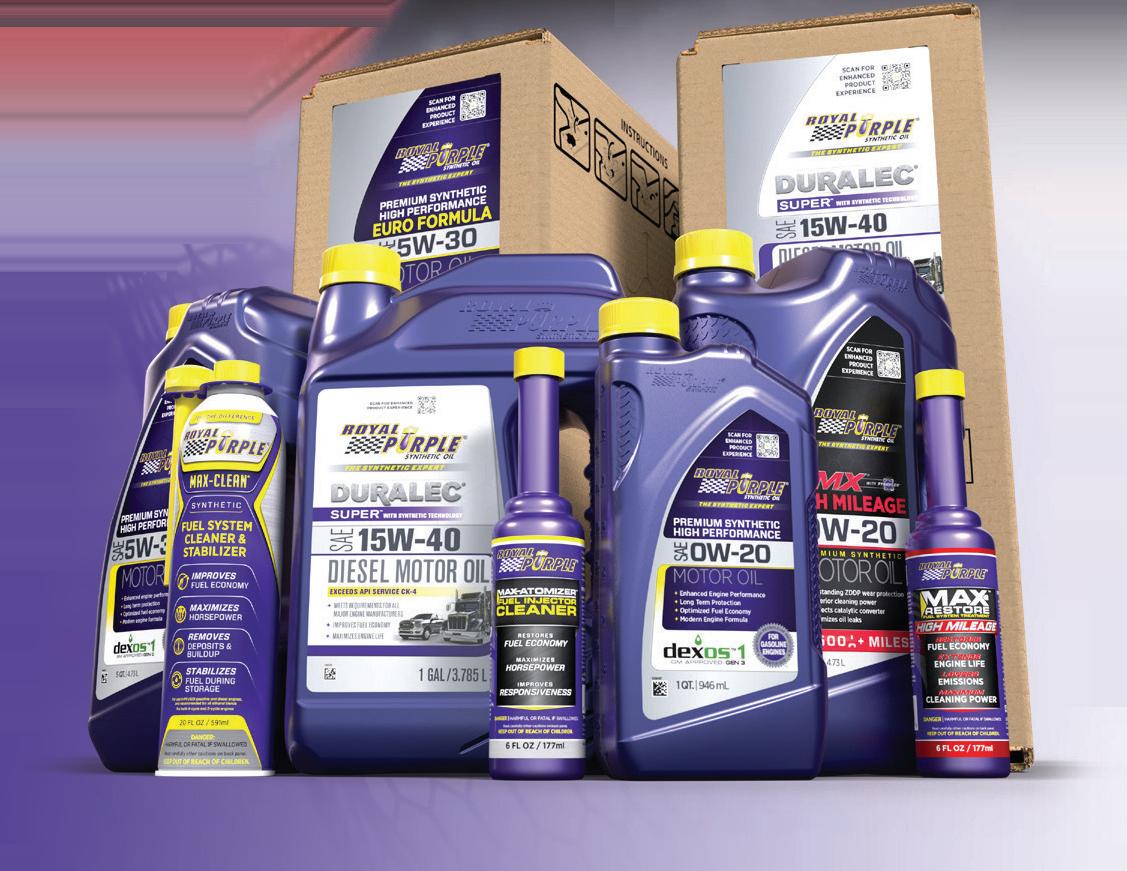




















































Introducing the Portable Oil ducing the Oi







































EVACUATES MOST PASSENGER VEHICLES ENGINES IN IN UNDER 3 MINUTES! UNDER 3

































































Introducing the Portable Oil ducing the Oi







































EVACUATES MOST PASSENGER VEHICLES ENGINES IN IN UNDER 3 MINUTES! UNDER 3




























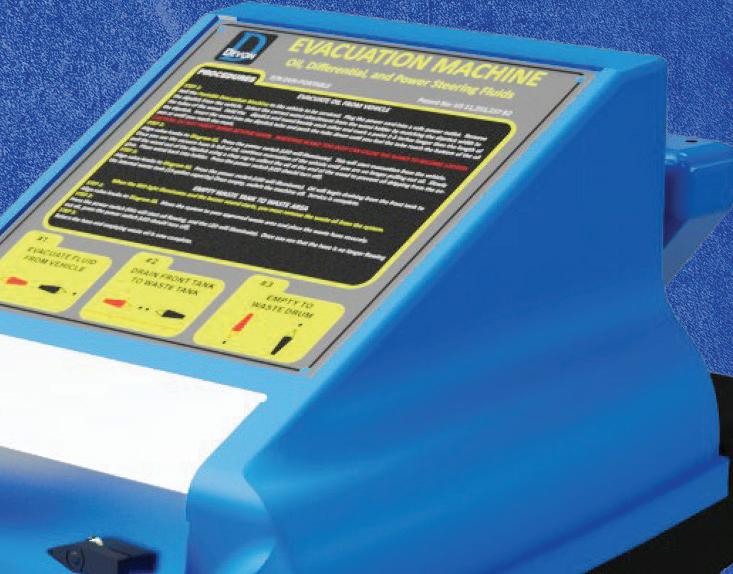





































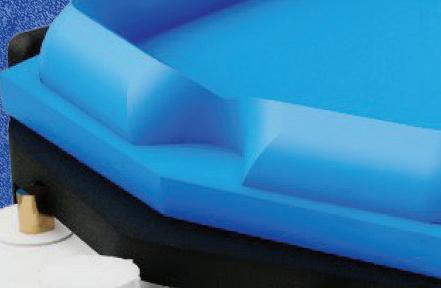





Devon D o ’s new Portable new Evacuation Machine is E tio M achine i perfect for:






















• Tire Shops Tire
















• Dealerships D l hips








• Quick Lubes Q i k L bes























• Service Centers Ser vice Centers
























































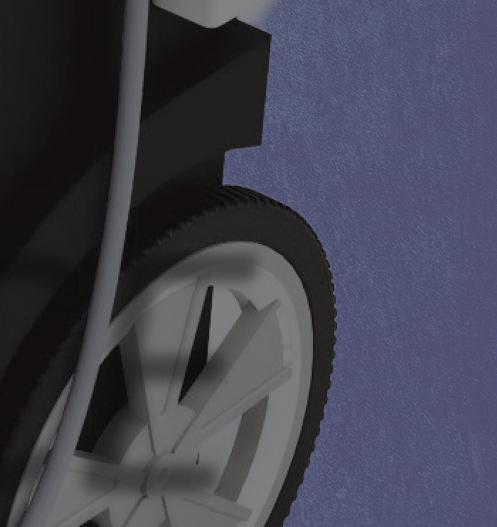










































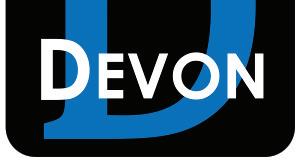
Revolutionizing Fluid Evacuation in Automotive Maintenance
Our evacuation machines deliver fast, reliable service without removing skid plates or drain plugs—cutting claims, saving time, and keeping bays moving. With full oil service performed topside, each unit transforms routine service into rapid performance!
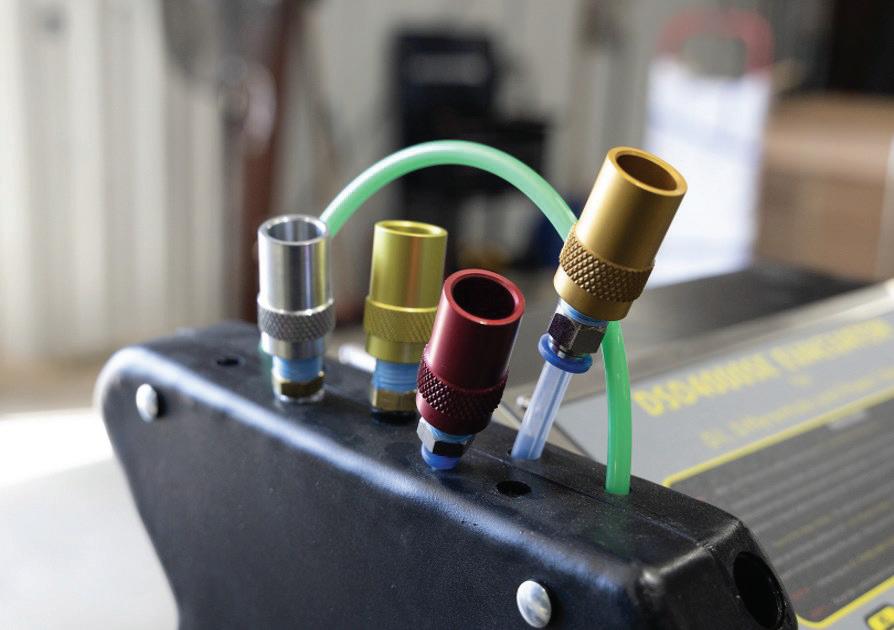
Static machines for mounting between bays, portable machines for everywhere else. Multiple hoses for maximum vehicle compatibility. Our Evacuation Machines were built for your shop, and designed for your customers!
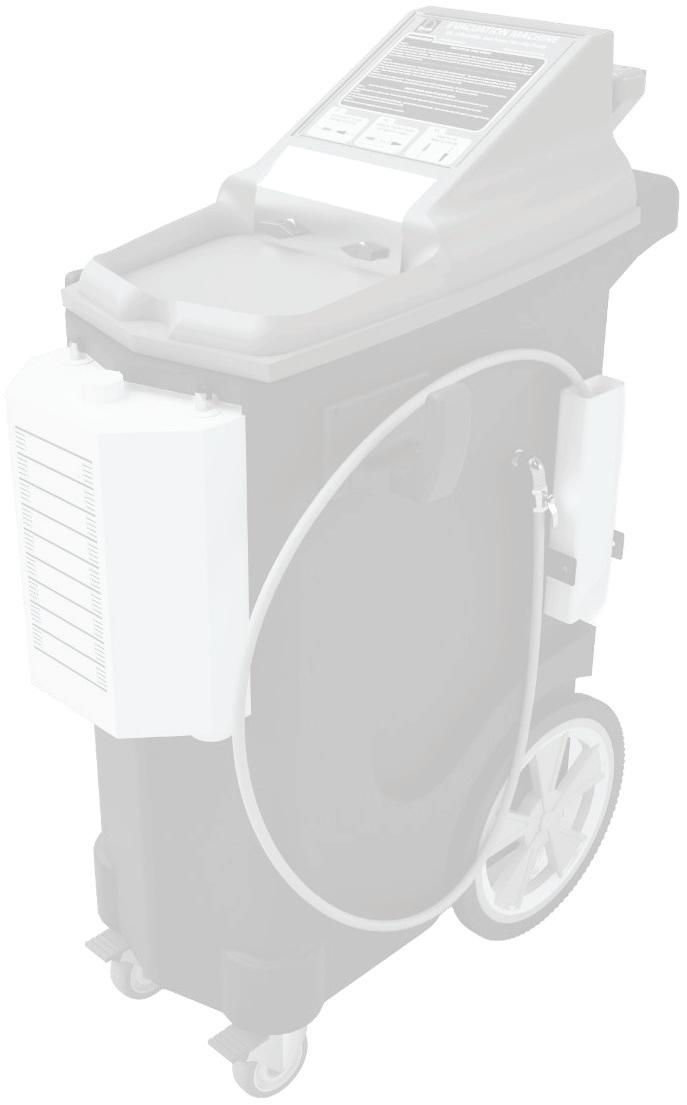
No drain plugs. No delays. Our Evacuation Machines pull 12 quarts in under 4 minutes— because every second counts!
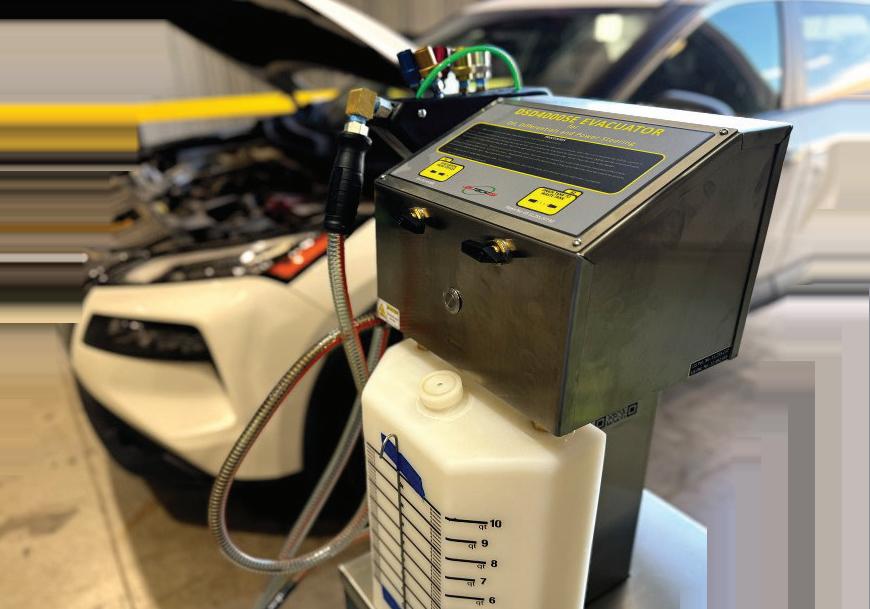

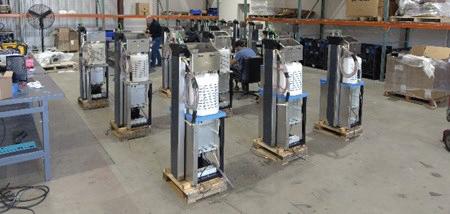
Intuitive interface. Minimal training. Built tough to handle your busiest days with zero second-guessing. Integrated safety measures ensure reliability.
Devon Industries continues to lead the way in innovative solutions for the automotive maintenance industry. Visit our website for extensive resources and support, including detailed manuals, instructional videos, install guides, and technical support.
www.devonlube.com .

































‘






Brian Glueck (left), co-owner of Charlie's Fast Lube with brother Jason, explains how the shop has refi ned its data-tracking processes
PAGE 20







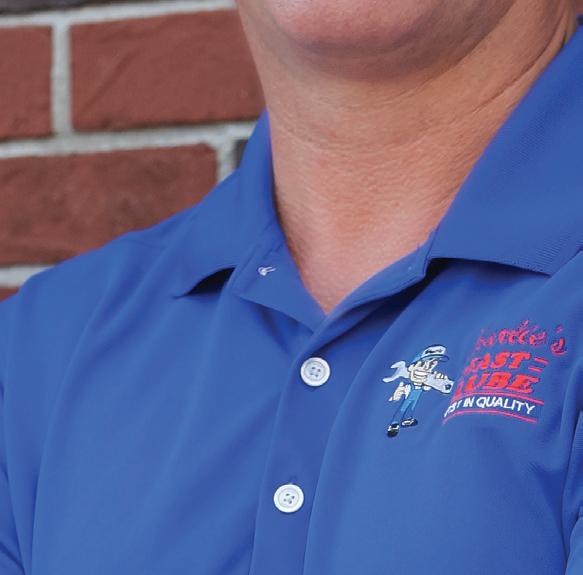






IS YOUR HIRING PROCESS UP TO SPEED FOR GEN Z? PAGE 18 SHOP OWNER LOOKS TO HIS LEGACY


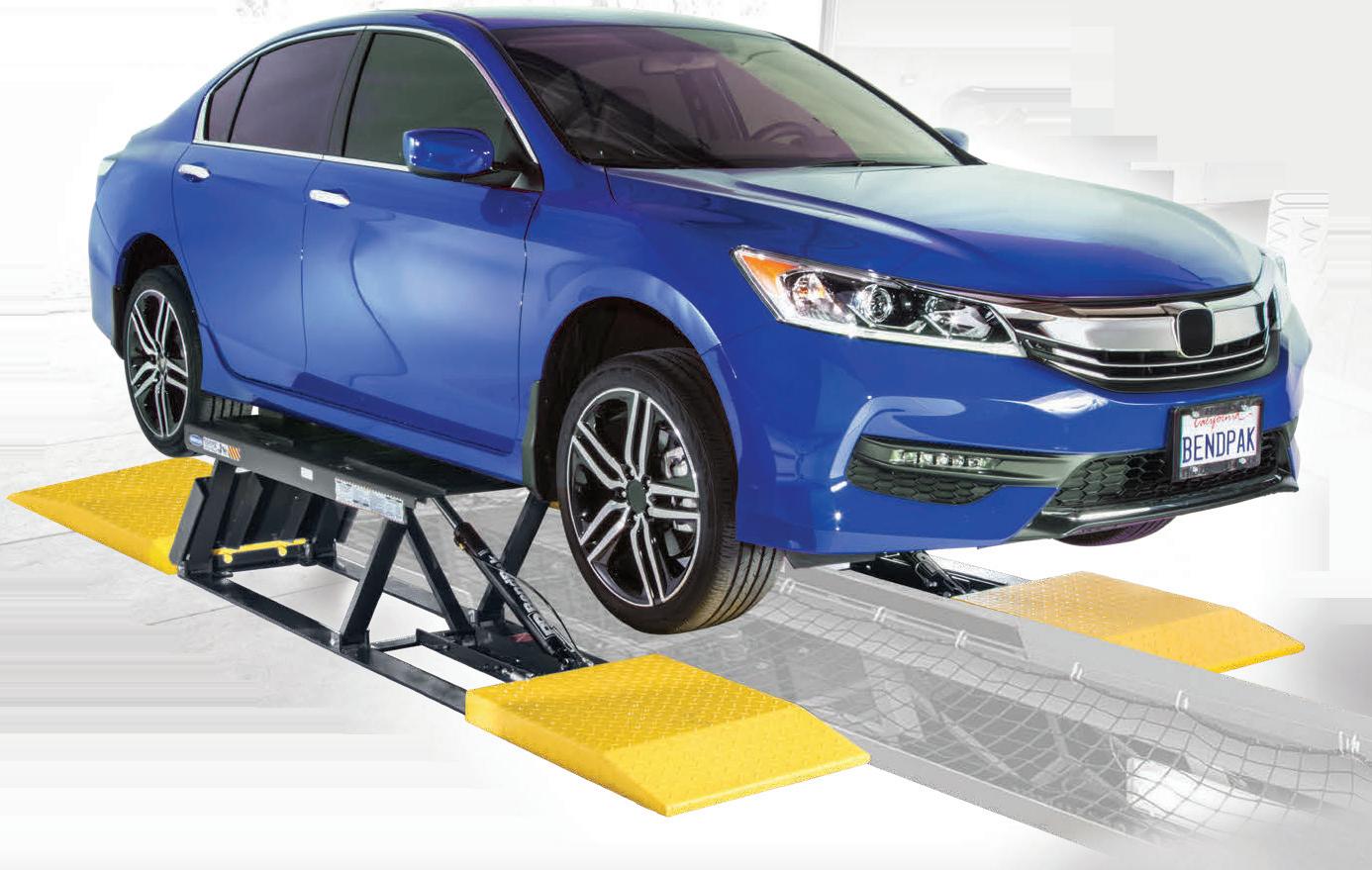






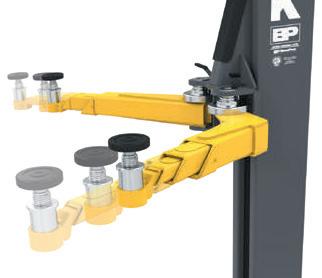























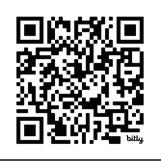
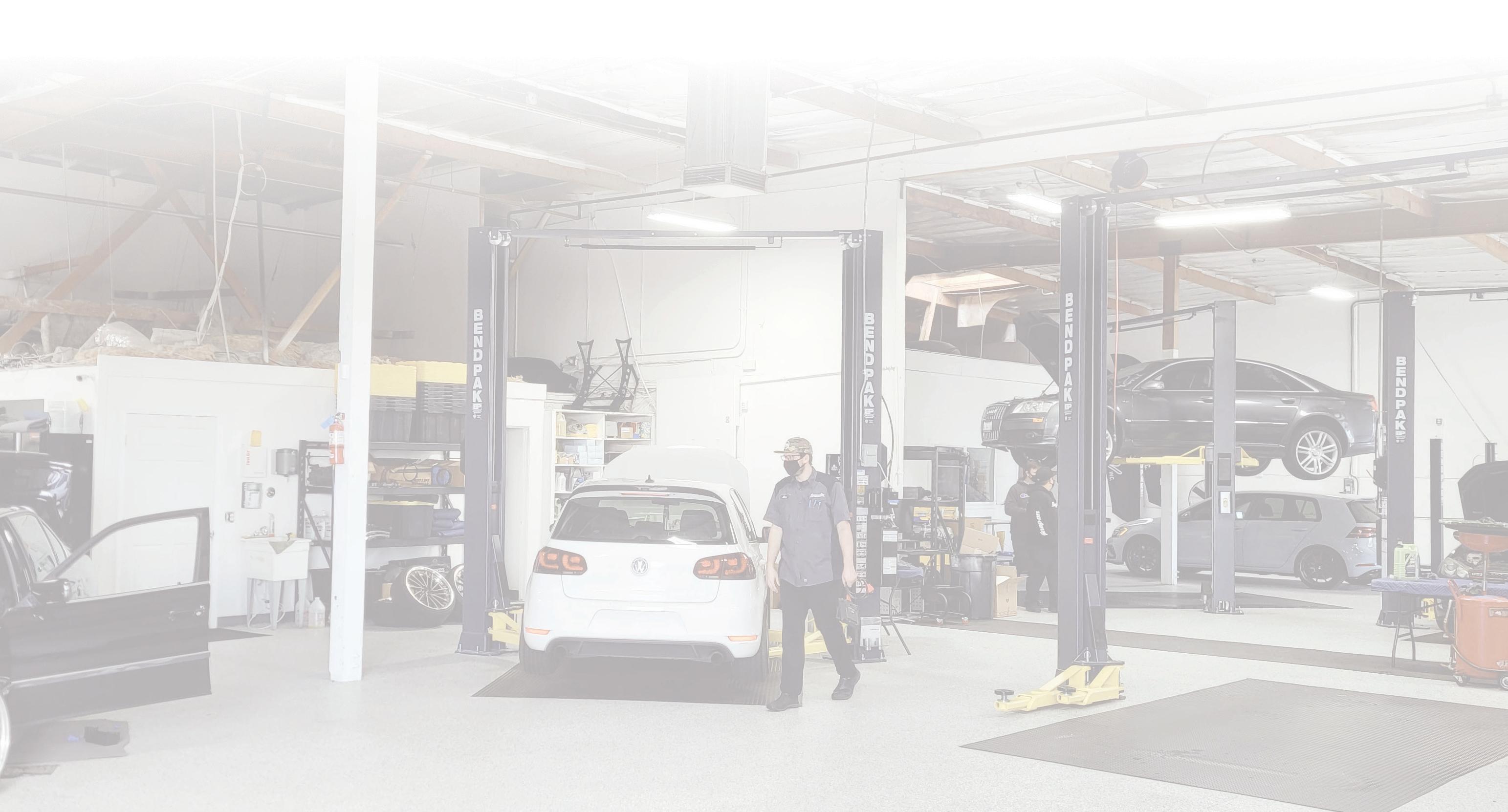


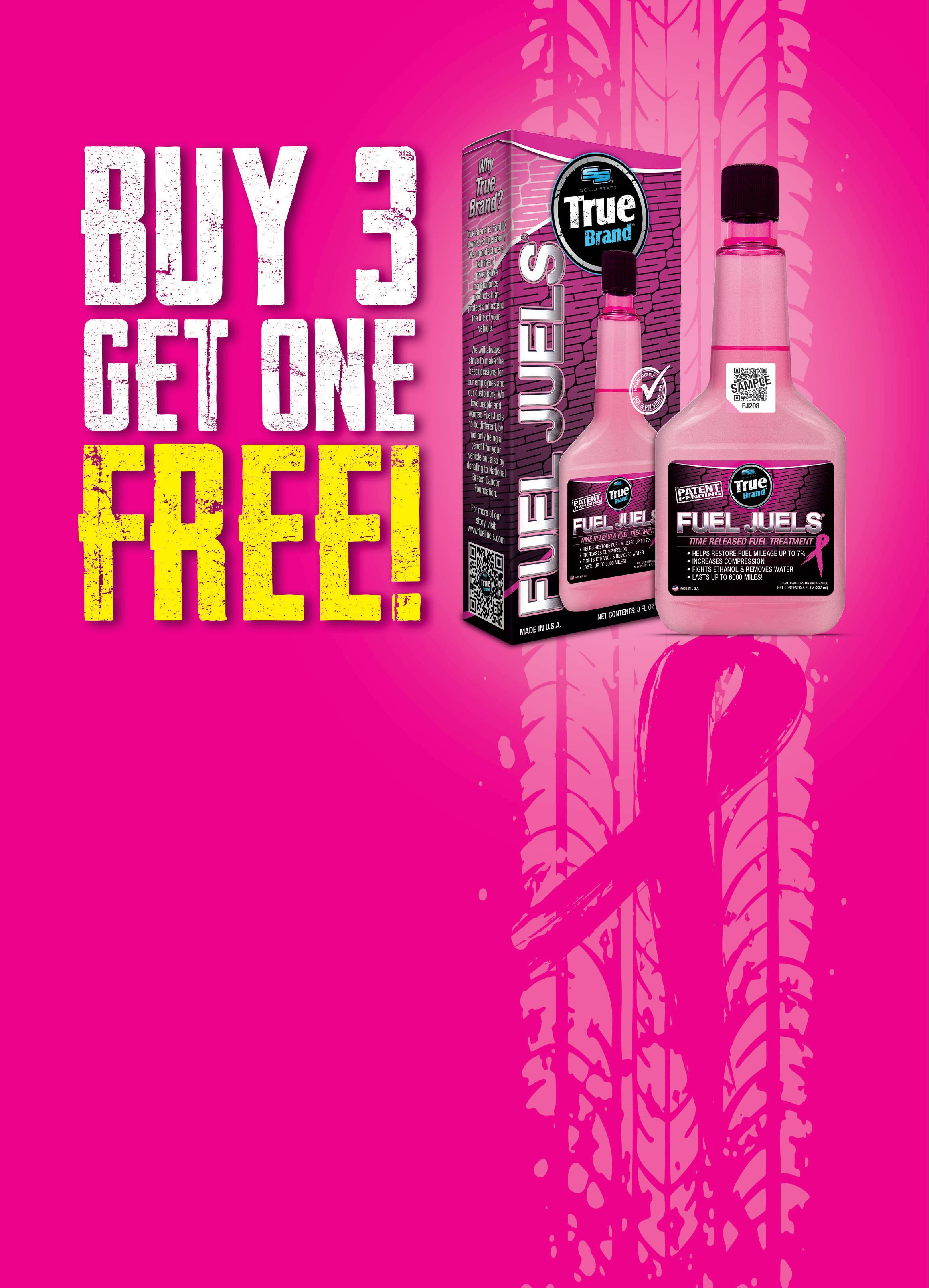




Get a FREE case of Fuel Juels for every three cases purchased from 09/15/25 until 10/31/25.
Help your guests save fuel, money, and lives when they add True Brand Fuel Juels® to their service ticket!
Fuel Juels is the ONLY time-released fuel system treatment in the world and has been proven to last up to 6,000 miles, providing:
• Restoration of up to 7% MPG
• Increased Compression

• Protection Against Ethanol
• Superior Water Scavenging
• and More!
... saving them $$$ at the pump, tankful after tankful!
True Brand is a proud supporter of the National Breast Cancer Foundations mission to provide help and inspire hope to those affected by breast cancer through early detection, education, and support services.





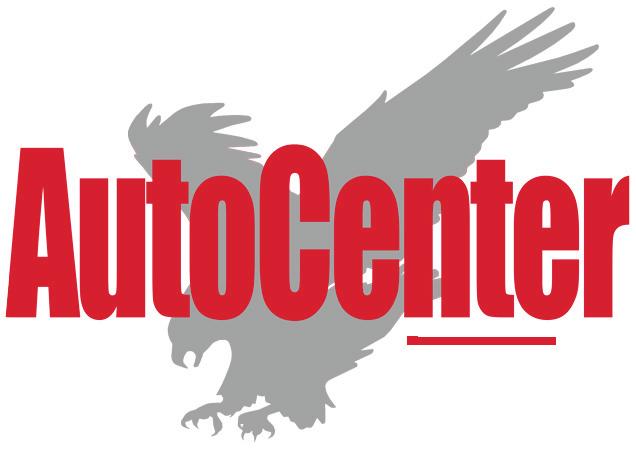

















EDITORIAL DIRECTOR Chris Jones
EDITOR Tom Valentino
ASSISTANT EDITOR Kacey Frederick
SPECIAL PROJECTS EDITOR Emily Kline
CONTRIBUTING WRITERS
Adam Tatum, Scott Hempy, Carol Badaracco Padgett, Peter Suciu, Enid Burns
Adam Tatum, DIRECTOR OF OPERATIONS, VIRGINIA GROUP
Joanna Johnson, PRESIDENT, JOHNSON POLICY ASSOCIATES
Scott Hempy, CEO, OILSTOP DRIVE-THRU OIL CHANGE AND HAPPY’S DRIVE-THRU CAR WASH
Aleisha Hendricks, OWNER/OPERATOR, GREASE MONKEY QUICK LUBE AND MONKEY SHINE CAR WASH
Shawn Gilfillan, OWNER, AUTOMOTIVE MAGIC AND MAGIC LUBE & RUBBER
PUBLISHER Greg Smith gsmith@endeavorb2b.com
ACCOUNT EXECUTIVES
Kyle Shaw kshaw@endeavorb2b.com
Diane Braden dbraden@endeavorb2b.com
Marianne Dyal mdyal@endeavorb2b.com
Chad Hjellming chjellming@endeavorb2b.com
Cortni Jones cjones@endeavorb2b.com
Lisa Mend lmend@endeavorb2b.com
Sean Thornton sthornton@endeavorb2b.com
ART DIRECTOR Erin Brown
PRODUCTION MANAGER Mariah Straub
AD SERVICES MANAGER Jen George
CEO Chris Ferrell
COO Patrick Rains
CRO Paul Andrews
CDO Jacquie Niemiec
CALO Tracy Kane CMO Amanda Landsaw

From
Charlie’s Fast Lube co-owner Brian Glueck explains how his team has refined its in-house system for tracking key metrics BY
26 PROFILE
Looking to His Legacy
Clifford Barnett’s long-term plan for his SpeeDee Oil Change & Auto Service business involves a future for his children
BY PETER SUCIU
Growing the family business
Since taking over for their father, Charlie’s Quick Lube co-owners Brian and Jason Glueck have overseen the development of a more detailed in-house data tracking system.
6 ONLINE Meet PAMA’s new president
8 NUMBERS
The big three
11 INDUSTRY INSIGHT
Tariff turbulence: How auto shops are navigating changing prices
14 AROUND THE INDUSTRY PAMA announces 2026–27 officers, board of directors
16 SHOP LOOK
Our Planet Automotive Services SERVICE
33 PIT STOP Trade shows offer 4 tangible takeaways
37 CUSTOMER SERVICE
Tire inspections help build customer trust
40 CASE STUDY
Grow your community by participating in events
18 MAINTAINING THE MISSION
Get your hiring and onboarding up to speed for Gen Z BY SCOTT HEMPY
42 FROM THE SHOP
Learn what kind of leader you are BY ADAM TATUM

Jason Lyon, chief operations officer for Benny’s Car Wash, recently was announced as the association president for the Preventative Automotive Maintenance Association’s 2026-27 term. Recently, he took time to speak with NOLN about his goals for PAMA, from better understanding the association’s membership to growing its education and training initiatives.
Lyon also discussed how Benny’s is relying on community engagement and personal interactions to grow its customer base and overcome the challenge of guests going longer between service visits.
Doug Zarkin has two decades of experience in retail and brand marketing, but he’s a newcomer to the quick lube industry. Zarkin was hired as the new chief marketing officer for Take 5 Oil Change earlier this summer, and he described the way in which he has observed Take 5 lube techs working as “nothing short of a symphony.”
On the NOLN Podcast, Zarkin shared what appealed to him about joining Take 5, what he has been able to carry over from his marketing experience with health and wellness brands, and the role of marketing as Driven Brands looks to grow the number of Take 5 locations across the U.S.


Head online to check out NOLN’s library of podcast interviews. Hear from quick lube leaders about new strategies, service stories, and innovative operations that push the industry forward.
Listen and subscribe at: noln.net/podcasts or subscribe to the NOLN Podcast on your favorite listening app.

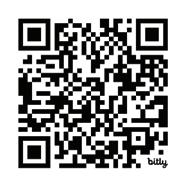

Have you subscribed to the newsletter? NOLN will send the latest industry news, strategies and profiles straight to your inbox.
Sign up at noln.net/subscribe.








November 4–6 • Venetian Expo • Las Vegas


Booth A1457
Joe’s Garage, Bay 7
BG Products helps you enhance vehicle performance, extend component life, and drive profitability with innovative products and equipment. Check out our new booth, and stop by Joe’s Garage for live service demos, including the 2025 MOTOR Top 20 award-winning BG BFX Brake Fluid Exchanger.

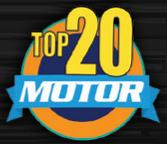
Learn

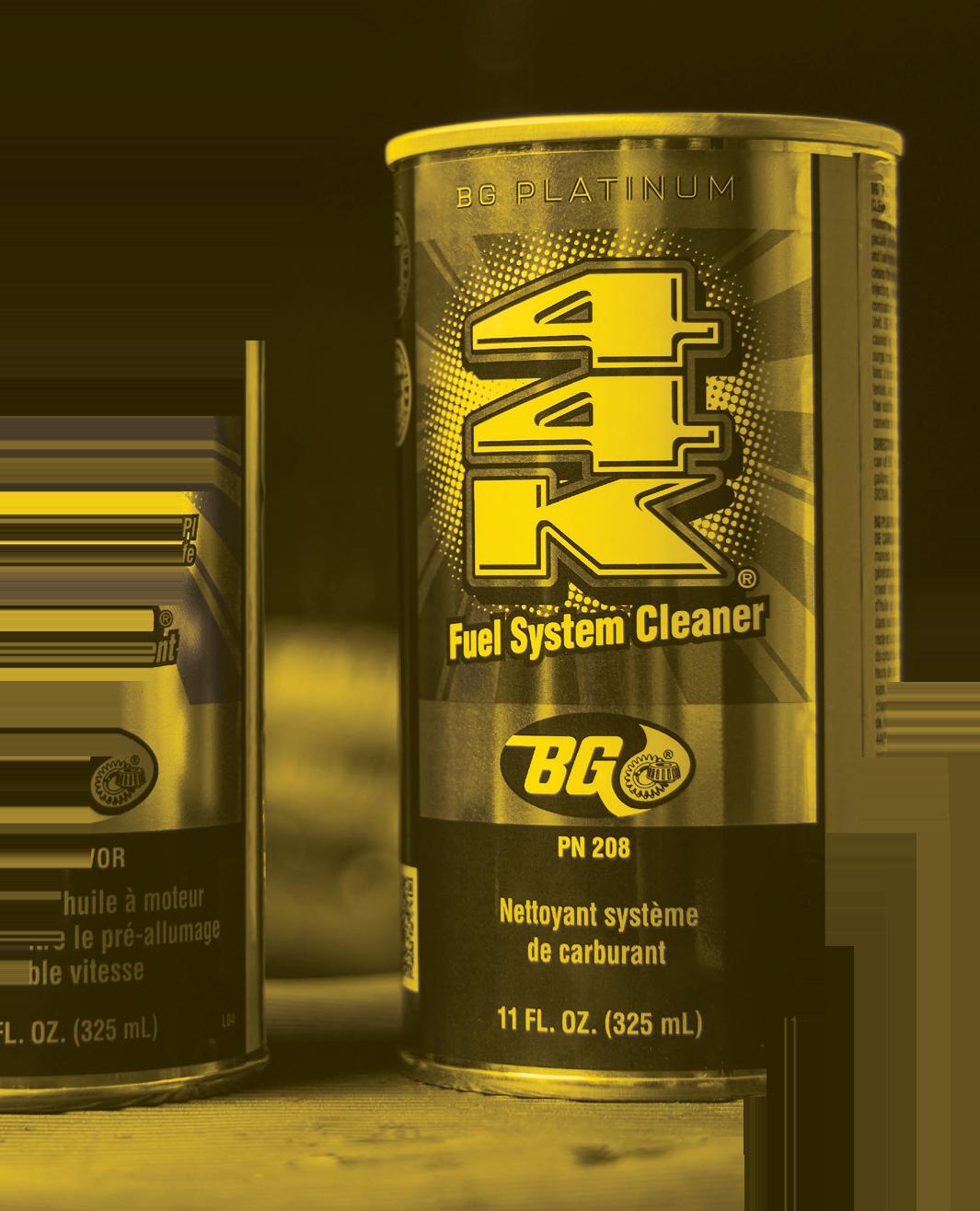









Labor, product costs, and extended service intervals are, by a wide margin, the most common issues challenging quick lube operators
BY NOLN STAFF REPORTERS
In the 2025 NOLN Operator Survey, respondents were asked about the biggest challenges facing their operation. Answers included market saturation (reported by 11.8% of survey participants), shop upkeep (10.3%), and the electrification of vehicles (10.3%), but a trio of challenges remain far above the rest.















































































































































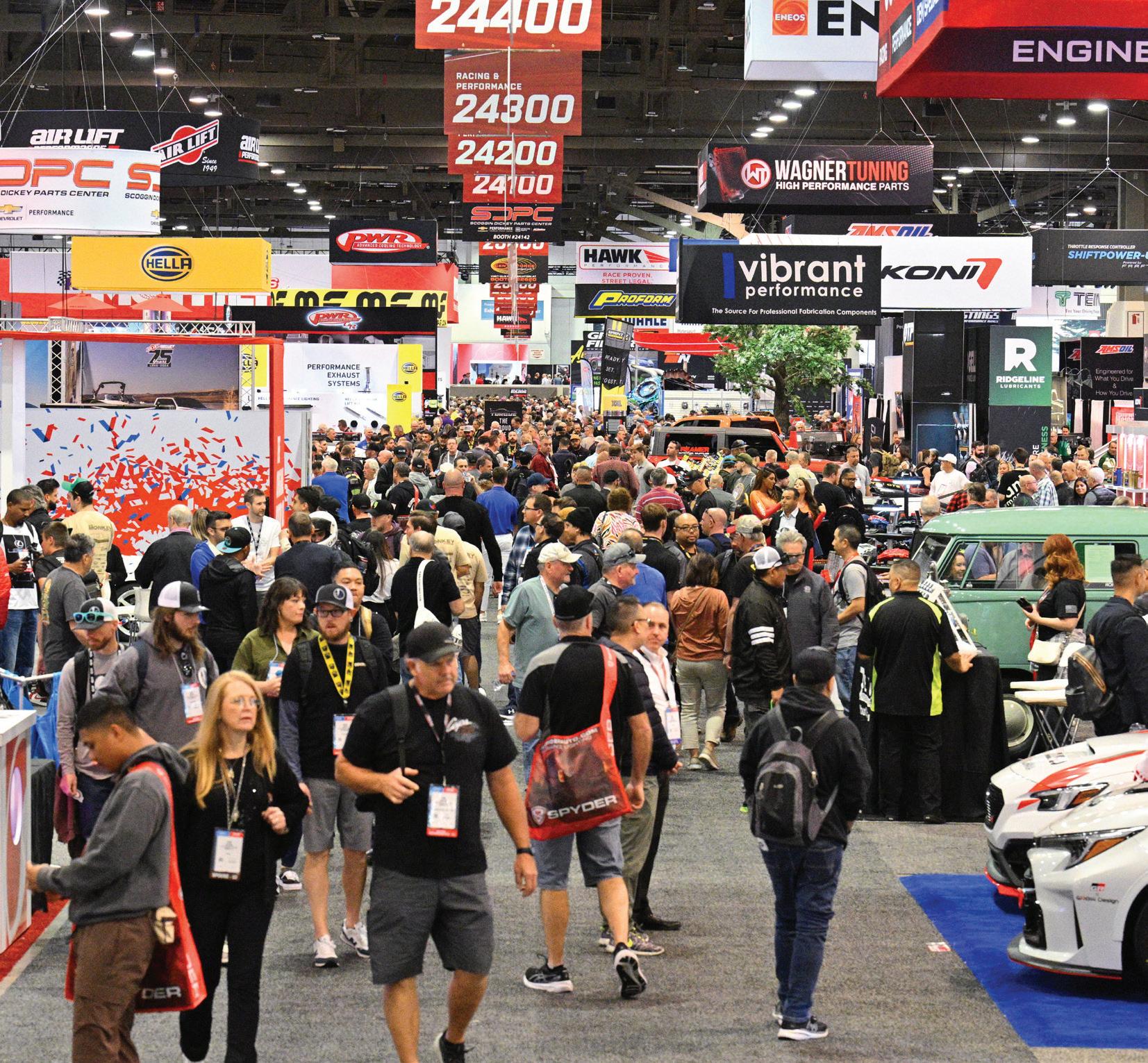











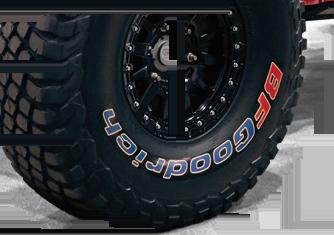

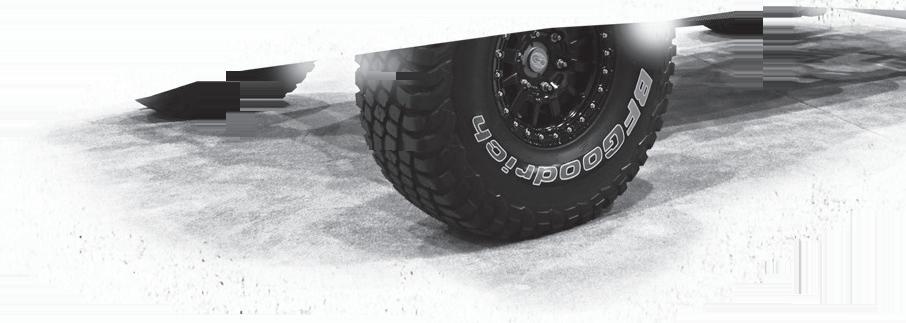






















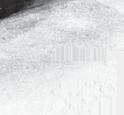




























Girlington Garage, a small shop based in South Burlington, Vermont, is doing the work to protect itself and its customers
BY KACEY FREDERICK
THIS YEAR HAS BROUGHT many headwinds for the auto service field—particularly with regard to tariffs. From independent shops and suppliers to dealerships
and automakers, the entire automotive field has been affected, as have several other sectors that rely on imported materials and goods. These national decisions are now
beginning to impact small, independent operations, like Girlington Garage, an auto shop in South Burlington, Vermont. Nya Key, the shop’s service manager, spoke with National Oil and Lube News about the changes shops like theirs are seeing and how they’re supporting their customers while taking care of their own needs.
Girlington Garage began noticing an uptick in prices in March. Since then, one of the biggest challenges has been an inability to stockpile inventory before prices creep up. Even if the shop knows price increases are coming, they just don’t have the space to store excess inventory.
“Especially being a small shop in a small state, when we first started hearing about the possibility of tariffs, we were very scared, because we don’t have the ability to stock up on parts,” explains Key. “We carry oil filters and fluids, but we can’t stock up for average, normal repairs.”
Adding to the struggle are suppliers who do not communicate price changes. Girlington utilizes a website that connects them to dealers for parts—but upon ordering certain components, they found the price was higher when they arrived than was advertised. This created significant obstacles for the shop as it tried to navigate the issue while taking care of its customers.
Fortunately, though, the shop has noticed suppliers being more upfront recently, especially on the aftermarket side. They’ve been made aware of upcoming price increases that aren’t quite as steep as they were earlier this year, underscoring the importance of being in close communication with shop vendors and suppliers.
“When my reps come in for our check-ins every month, I am getting
more of a warning,” shares Key. “Prices are still changing, but it’s happening at more of a slower (pace) and shorter amount. So, the cost of our brakes just increased by like $10, which is a lot easier to chew than having a price that was two times the amount we quoted.”
As prices continue to fluctuate, there are measures shops like Girlington are taking to mitigate the impact. For Key, this means staying on top of parts pricing and locking in prices in advance to secure the best deal.
“When we’re ordering parts, or when I have a customer that has an OEM part, I double-check parts availability, and I order it right away. So, let’s say the job’s two weeks out; I make sure to lock in that price as fast as I can, just to not have any changes,” explains Key.
Aside from price changes, Girlington has faced difficulty in the availability of parts, particularly for non-domestic manufacturers. Metal components, like exhaust systems and rotors, have been especially difficult for the shop to acquire
recently. Meanwhile, brakes are almost entirely OEM right now and are typically on backorder or take several weeks to arrive.
Since Girlington is unable to stockpile components, the shop takes preemptive measures to avoid a surplus of unused parts. For example, parts that require special order necessitate a deposit from the customer that typically sits around 15%, which the shop calls a restocking fee. And for parts that can’t be returned, customers must pay for them upfront. These policies help protect the business from losing out on inventory that is ordered but cannot be used.
“That is kind of how we protect our business, just because we’re so small,” says Key. “Even now, I have a couple of parts that I’ve purchased within the last year that are just sitting here because I can’t return them, and it really takes a lot of cost to just hold parts that you can’t use.”
Customers are increasingly worried about how and when rising prices will impact them. Girlington has seen more customers coming in
asking about when the shop expects prices to change. While Key does her best to stay updated, it’s difficult to know in advance if something will change.
For some customers, this prompts them to request that certain components be replaced when they don’t need to be. At Girlington, they emphasize that it’s always the customer’s choice, and make it clear to each customer what the status of their vehicle is and what it needs—but Key cautions customers from making purchases purely out of fear, as no one can predict what changes are in store over the next few months.
“It’s always their choice, but I do try to guide them toward the need of the repair more than the pricing,” says Key. “Because I don’t have proof of when things are going to increase, and the whole point of being in service is to make sure things are done right the first time and that the vehicle is safe. So, I always try to give them the guidance that I have. But since we are not parts manufacturers or suppliers, I’m still guiding in the way that I’ve always guided as an advisor or service manager.”








Improve engine performance and fuel economy, fight everyday wear and tear and help reduce emissions.
API-licensed oils display an API certification mark to signify the highest performing oils.
To search the complete list of licensed companies and products, visit our licensee directory at:
The Preventative Automotive Maintenance Association announced its officers and board of directors for the 2026–27 term in a recent press release. The following operators, franchisees, and vendor partners will be serving as 2026–27 PAMA officers:
• President: Jason Lyon, Benny’s Car Wash & Oil Change
• Vice President: Jenn Bochnowski, Breeze Autocare
• Treasurer: Matt Callahan, FILPAC
• Secretary: Chris Dykes, Jiffy Lube International, Inc.
• Immediate Past President: Jennifer Slifka, Exxpress Lube
Serving as directors for the 202627 year are the following:
• Doug Arnold, Service Champ –Vendor Director
• Justin Cialella, Victory Lane Quick Oil Change – Director
• Tyson Daniels, Threshold Automotive Service, a Franchise of Grease Monkey – Director
• Crystal Mathews, Solid Start/True Brand – Vendor Director
• April Maxey, Lucas Oil Center – Director
• Dan Wyse, Valvoline Inc. – Director The 2026–27 board plans to focus on strengthening advocacy for the quick lube and automotive service sectors, expanding professional development opportunities for operators and staff, and enhancing consumer education on the importance of preventative maintenance.
VICE PRESIDENT, CHIEF OPERATING OFFICER OF DRIVEN BRANDS
Driven Brands’ board of directors has named Mo Khalid as executive vice president and chief
operating officer of Driven Brands, according to a recent press release. Khalid re-joined Driven Brands in 2023 as group president of the maintenance segment, which at the time included Take 5 Oil Change and Meineke. Prior to that, he served as chief operating officer of Meineke from 2016 to 2017.
RelaDyne named Mike Cooper as its newest chief commercial officer in a recent press release. Cooper joins the company with over 30 years of experience in the automotive and retail sectors, and has filled his new role as of Aug. 26.
The company cited Cooper’s understanding of its customer needs and sales channels, in addition to a track record of enhancing customer relationships and strengthening operations, as factors for his addition to the team.
Women in Auto Care has announced the events it will be hosting on Nov. 5 at AAPEX in Las Vegas.
For the first time this year, the Women in Auto Care Awards Ceremony will be held during the annual Women in Auto Care Breakfast, from 7 a.m. to 8:45 a.m. at the Venetian Expo.
The breakfast will feature the presentation of the Women in Auto Care Awards, which recognize outstanding achievements and contributions of women and allies across the automotive aftermarket. Tickets will be $60 per person, with VIP tables available.
Later that day, the Women in Auto Care and Their Allies Reception will
be held, 5 p.m. to 6 p.m. at the Venetian Expo. No registration is required, as this event is open to all AAPEX attendees.
The National Institute for Automotive Service Excellence has partnered with EndeavorB2B and its Motor Age publication to launch a weekly newsletter called “ASE Certified Tech Edge,” as shared in a recent press release.
The first issue of the newsletter, a co-branded project between ASE and Motor Age, was scheduled for distribution on Wednesday, Oct. 1.
The newsletter content will include Motor Age technical articles and news, as well as videos with source content hosted on the Vehicle Service Pros and Motor Age YouTube channels. ASE will provide content that links back to the ASE website, and a new test question of the week will be featured in each newsletter.
Ford is currently facing a lawsuit alleging excessive oil consumption in F-150 pickup trucks with the 5.0L V8 Coyote engine, according to Ford Authority.
The suit, Bryan, et al., v. Ford Motor Company, revolves around 2018 to 2020 Ford F-150 pickups with Coyote V8 engines. It claims the engines are defective and consume excessive amounts of oil, in addition to oil entering the combustion chamber, leaving carbon deposits behind and harming fuel efficiency. The suit also alleges there is incorrect info in the owner’s manual about how much oil should be added and how often.
Automotive supplier Old World Industries has announced plans for a $20 million expansion in Prattville, Alabama, reports The Montgomery Advertiser.
Based in Northbrook, Illinois, the company serves the automotive aftermarket, offering brands such as PEAK automotive antifreeze and coolant and BlueDEF diesel exhaust fluid.
The expansion comes with a capital investment of over $20 million. OWI expects the project to allow for additional product lines and delivery options for the Southern market.
OWI CEO Warren Morrow said that the expansion will bring an
emphasis on producing locally and following key market trends, with plans to grow its distribution footprint and packaging capabilities and offer more products that meet regional demands.
A recent national survey from FinanceBuzz shows that U.S. drivers are avoiding essential maintenance due to fear of costs, as shared by Motor Biscuit.
The survey of 1,000 U.S. adults found that 58% of drivers can’t handle an emergency repair bill of over $1,000. Over a quarter said they couldn’t afford one over $500.
Unfortunately, this seems to be leading to drivers putting off essential maintenance. Nearly one in five drivers are driving on tires that need to be replaced, while 7% are driving with bad brakes. Additionally, almost four in 10 drivers said they let a dashboard warning sit for two weeks or more without taking action.
The reason behind this, for many, is cost related, with 42% saying the potential repair bill was the reason they had put off receiving essential maintenance. This has led to drivers having to pay even more for repairs they wouldn’t have otherwise needed, with two-fifths of respondents saying they received repairs that could have been avoided with maintenance.







Peg and Tyler Dowling, a motherand-son duo, have teamed up to run an efficient and eco-friendly automotive service facility
LOCATION: FOREST PARK, ILLINOIS
OWNERS:
TYLER DOWLING AND PEG DOWLING
STAFF SIZE: 5 SHOP SIZE: 3 BAYS
BY TOM VALENTINO
TYLER DOWLING
SHORTLY AFTER HIS HIGH school graduation a generation ago, Tyler Dowling enrolled in trade school and quickly learned that he enjoyed—and had an aptitude for—performing automotive maintenance. He has now been an ASE-certified technician for 26 years. His mother, Peg Dowling, meanwhile has established a keen sense for business operations. She served as an administrator at Montessori schools for 25 years.

In 2014, mother and son put their skills together and launched an automotive service business of their own. Once a location was secured, Our Planet Automotive, an eco-friendly auto repair facility in Illinois, opened its doors in 2015.
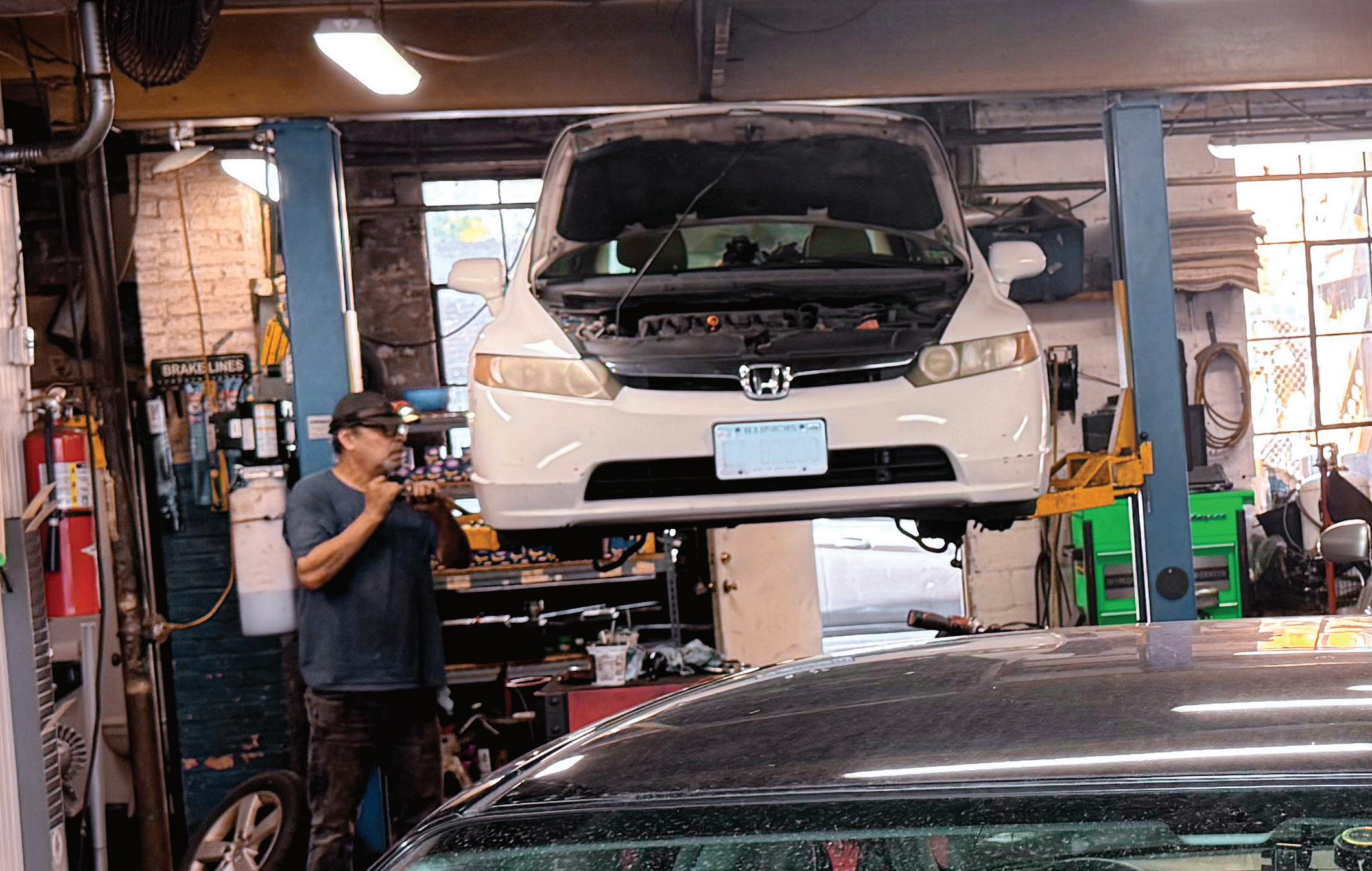

Carving out a niche as an ecofriendly auto shop was a goal for the Dowlings well before they officially opened.
“I never really understood why we couldn’t recycle just about everything coming through an automotive shop,” says Tyler. “Every part comes in a cardboard box. Let’s put that in recycling. All the metal and plastic that comes off cars, we can disassemble and recycle properly. It was a simple idea to implement in the automotive industry. I had not seen it before, at least not in this state.”
Most cardboard and plastic goes into a normal recycling bin, which is then picked up by the local garbage collecting company. A scrap collector takes away much of the discarded metal.
Our Planet Automotive also uses motor oils that are up to 50% recycled or re-refined, as well as non-toxic, biodegradable antifreeze. Our Planet Automotive’s other ecofriendly practices include:
• Using organic and water-based solvents
• Having a paperless workflow system
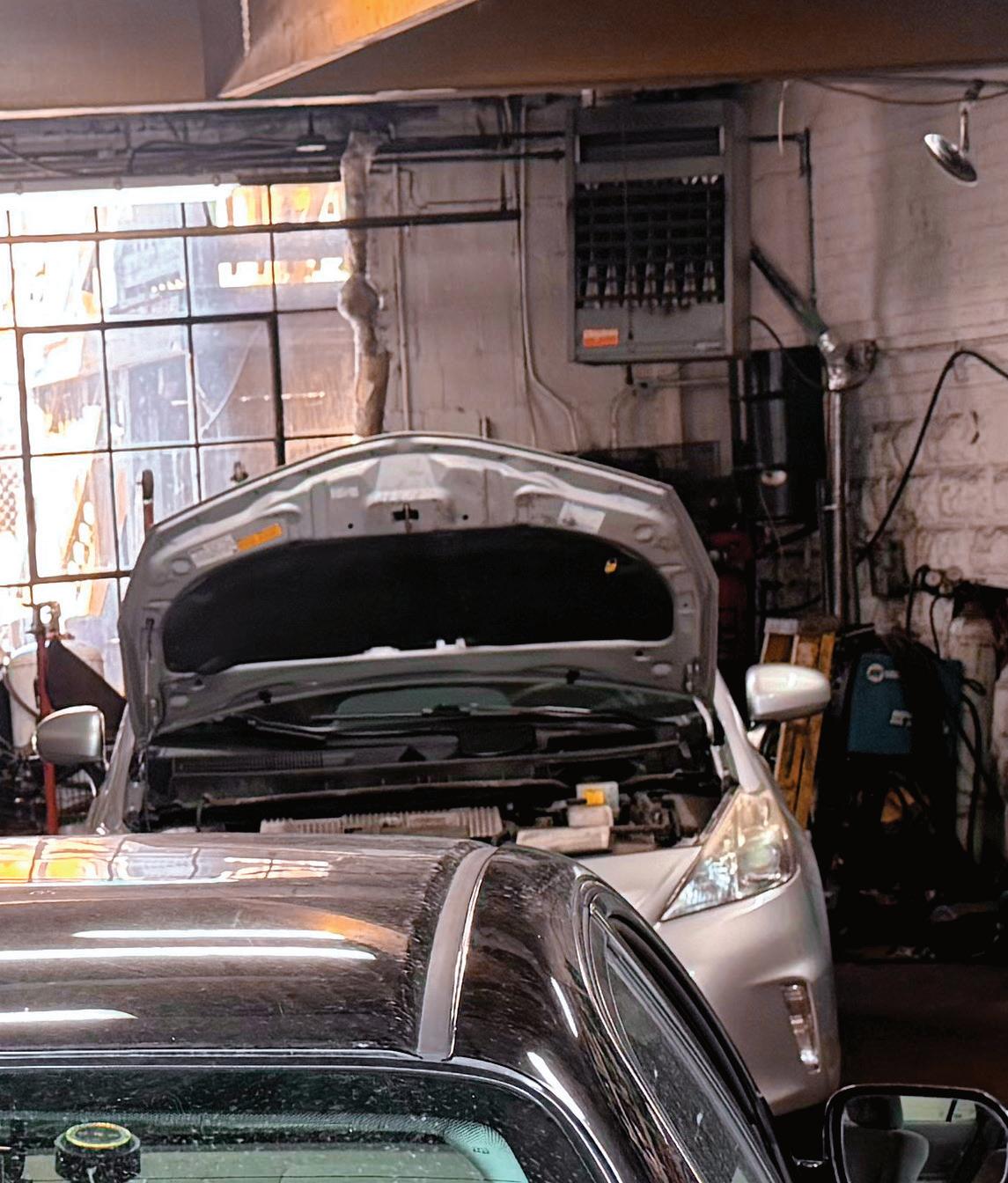
(although the shop will print out work orders and documentation to customers on request, Tyler clarifies)
• Serving compostable coffee in ceramic cups, and using compostable water cups
• Cleaning with cloth towels that can be washed and reused
Our Planet Automotive’s eco-friendliness appeals to some customers, but quality work still comes first, says Peg.
“(It matters) to some, but some people don’t care (about the shop’s eco-friendly initiatives),” says Peg. “Some people care more about the fact that Tyler is a personable mechanic, and you can talk to him. He’s honest and fair with them. I think, for the most part, people think the eco-friendly part is a bonus, but we definitely have some customers who are coming to us just because of that.”
Our Planet Automotive is a single-shop operation that is now in its third location. The current building, tucked away in a quiet corner of Forest Park, Illinois, is a bit smaller than its predecessors, but it has been a blessing in disguise for the Dowlings. The family was forced to relocate in
2020 when the previous space they were renting was in a building that was sold to a new owner.
The current facility opened a month before the onset of the COVID19 pandemic. Having a smaller shop meant lower operational costs, which offset losses from business dropping at the time, says Tyler.
While her son runs operations in the shop, Peg says she mostly works from home now, in large part because the facility has limited office space. The arrangement has been working, she says.
“I’m mostly doing paperwork anyway,” Peg says. “Occasionally, I’ll get a call because they’re busy. ‘Can you go pick up a part here or there?’, and I do that, too. Sometimes, I give customers rides when they drop off their car. I’m just sort of an auxiliary to the actual running of the business.
“I keep (Tyler) out of trouble with the state, with the sales tax and other taxes, and that sort of thing,” she adds with a laugh.
“She has always been exceptional at knowing the ins and outs of operating a business at the highest level,” Tyler says of his mom. “And I think our dynamic together has really worked out great because she helps me learn things I didn’t know (on the business side), and I definitely help her learn more about cars.”

Our Planet Automotive has two lifts and room for a third vehicle, as well as a parking lot where other customer vehicles can be stored as needed. Business ramping up in recent years has necessitated the shop to keep things moving along when vehicles are brought in.
“There’s a level of efficiency that has to be maintained in a shop this small when we had 10,000 square feet before,” Peg says. “It was way more than we needed, so cars could sit. We can’t do that anymore, so you have to keep them turning over when you’re in a smaller location.”
In addition to quick lube services, Our Planet Automotive performs “everything from general maintenance, brakes, and tires, to advanced diagnostics, engines, and transmissions,” says Tyler.
“We don’t do a lot of rebuilding in-house, so we usually farm that stuff out,” he explains. “But we definitely work on high-end vehicles, as well as the beaters around town. There’s no job too big or too small for us.”
Looking ahead, Tyler says he and his mom would be open to relocating again if they can find “a perfect building at the right price that we could purchase and move into.” Tyler has certifications in hybrid and electric vehicles, and with the industry’s move toward more ADAS systems, there are tech-centric opportunities to expand the shop’s service offerings, he says.
Tyler’s son, who is now in his sophomore year of college, worked at Our Planet Automotive during the summer, and he has expressed an interest in someday taking over the family business.
“So, certainly, if we’re trying to move it on to the next generation, then we definitely need to keep goal-oriented to keep growing the business and moving into something a lot more permanent of a location,” Tyler says.
The workforce’s new generation seeks speed, clarity, and a sense of professional purpose


WALK INTO ANY SERVICE CENTER TODAY

Scott Hempy leads the team at Oilstop Drive-Thru Oil Change and Happy’s Drive-Thru Car Wash. Oilstop and Happy’s are rapidly growing their footprint of oil change and express car wash locations across the West Coast, combining convenience with an outstanding emphasis on guest experience. Prior to Oilstop & Happy’s, Scott was the founder and CEO at Filld, a SaaS-based software solution for last-mile oil and gas delivery companies. He was recognized as a member of the Forbes 30 Under 30 class of 2016 for starting Filld.
.COM
and you’ll notice a new workforce is present. The technicians pulling drain plugs and grabbing the greet are younger, and more often than not, they’re members of Generation Z. This group, born between the late 1990s and early 2010s, is rapidly becoming the backbone of service in the quick lube industry, already accounting for 25% of the workforce in 2025. That shift brings tremendous potential. Gen Z is sharp, digital-native, purpose-driven, and ready to grow. But it comes with a new set of expectations around communication, training, and career development. If our industry doesn’t meet those expectations, we risk losing members of this generation to the next opportunity down the road.
Hiring and developing Gen Z talent isn’t complicated. It’s just different. And if we’re intentional about how we bring Gen Z on board and help them grow, we’ll be building the next generation of leaders in our bays.
It starts with how we attract them to the oil change industry and open opportunities. Gen Z doesn’t respond to generic job postings or long hiring funnels. They expect speed, clarity, and a sense of purpose. At Oilstop, we recently began using an AI tool to help us screen and get back to applicants within five minutes from when they apply for a phone screening. This responsiveness is necessary and expected from the digitally native generation. If your application process takes more than five minutes or isn’t mobile-friendly, they might not even finish it.
Once a new team member is hired, the first impression goes a long way. A sloppy onboarding experience where uniforms aren’t ready, nobody introduces themselves, or day one feels
like chaos sends a message. So does a clear training plan, a clean service center, and a manager who knows their name. Structure and hospitality matter just as much for your team as they do for your guests.
Training Gen Z requires a mindset shift. They’ve grown up on YouTube, learned on-demand, and expect fast feedback loops. For many in Gen Z, that’s how they were taught in school. Long classroom sessions or binder-heavy manuals won’t land. Break training into focused sessions. Use videos, shadowing, and visual tools, and make progress visible with skill ladders or achievement boards. The goal isn’t to dumb it down, but to meet your new hires where they are and help them rise.
Feedback is another opportunity or liability. Gen Z doesn’t want to wait three months to know how they’re doing. In a tech-native world, feedback is instant. New team members crave regular, short feedback bursts: “Nice work with that greet.” “Really strong filter presentation.” “Let’s tighten up that checklist walk-through.” Recognition and course-correction in real time go a long way toward loyalty.
Finally, promote potential, not just tenure. Gen Z wants to grow, and they’ll move on quickly if they feel stalled. You don’t have to hand out titles that aren’t deserved, but you do have to show them what’s possible. Lay out a path: technician, certifications, assistant manager, team trainer, store manager. This will help them achieve and pursue that path of growth if they find their fit and purpose in changing oil.
The quick lube industry is built on being fast, efficient, and guest-first. That same focus should be applied to how we adapt to build our teams for the future.
PHOTO: SCOTT HEMPY




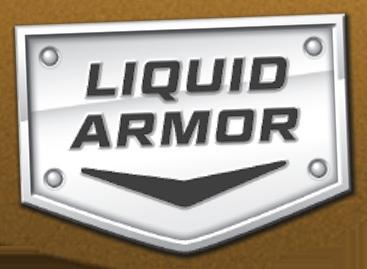


⊲
⊲
⊲
⊲
⊲ 4 Top 5 Finishes
⊲ Host of “Stacking Pennies” Podcast

















































































































Charlie’s Fast Lube



co-owner Brian
co-owner Brian
Glueck explains how his team has refined its in-house system for tracking key metrics
by Tom Valentino
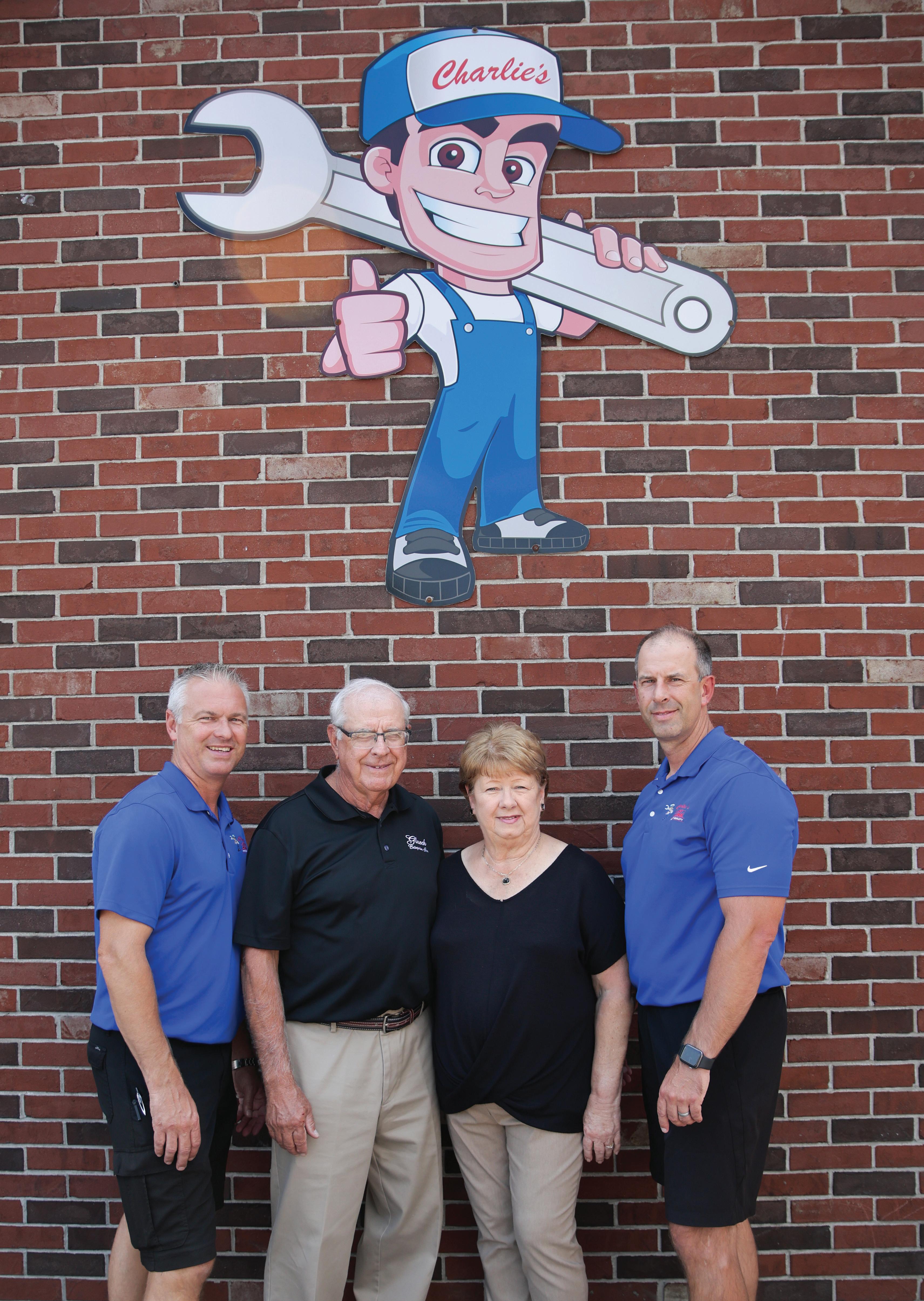
With a network of seven Charlie’s Fast Lube shops across Missouri and Illinois, as well as five full tire and automotive centers, business is humming along nicely for owners Brian and Jason Glueck.
The company employs about 100 team members in total, including 40 at its fast lube locations. Those oil change shops, mostly located in rural markets, average between 20 and 50 vehicles serviced per day.
At the center of the operation, Brian Glueck keeps tabs on the health of his business through an in-house KPI-tracking system. The platform has been refined and developed significantly in the past five years, and it’s a far cry from where Glueck’s father, Charlie, began when he opened his first tire and auto shop in Jackson, Missouri, in 1980.
“In my years growing up, Dad’s No. 1 KPI was, ‘Is there money in the bank to pay the bills?’ That was it. That’s all he tracked,” Brian Glueck says. “For him to have an idea, even with the lube shop, of how many air filters we were doing a week or a month or anything, we just didn’t have that. It was more a question of am I making money or not? Can I survive until tomorrow?”
Brian Glueck speaks from firsthand experience, as he began helping around the shops at a young age.
“Growing up in the industry, you get roped into work,” Glueck says.
The team at Charlie's Quick Lube has refined its system for compiling and reporting its KPIs.
“Even at a young age—10 or 12 years old—he started us in the quick lube with vacuuming cars, checking tire pressures, that sort of thing.”
These days, now as a second-generation business owner, Glueck finds himself checking numbers that are a bit more complex than tire pressure levels. When asked about the KPIs he is tracking across all his locations, Glueck rattles off a lengthy list.
“We’ve got all the basic things that I think most operators are going to track,” he says. “You know they’re going to look at your sales. They’ll look at car counts and ticket averages, and then look at that percentage relative to your car count of air filters and cabin filters and different things you service. We have about 13 different things that we offer that we track relative to a percentage of car count to give us a good idea of what that is.
“Along with that, we also try to look at labor percent to net sales. There are a few other things like that we track as well.”
While many quick lube operators have enlisted the services of an outside vendor or software to assist with data tracking and analysis, the operation at Charlie’s is homegrown. Over the past five years, spreadsheets have been developed internally to foster collaboration between locations with regards to metrics.
“Our point-of-sale is not directly incorporated into QuickBooks,” Glueck says. “(The store managers) do a lot of data entry at the end of

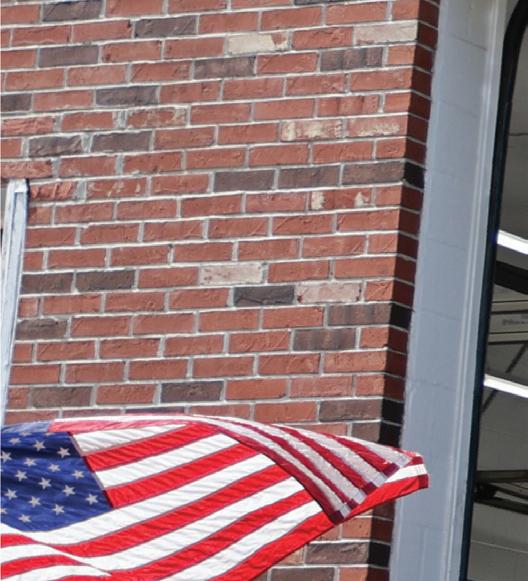

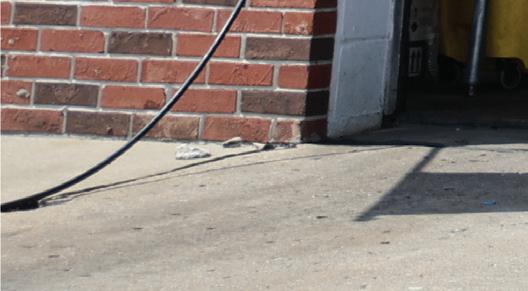





the day. They fill out a spreadsheet that is hosted on the cloud. And they fill out that sheet every day from their point-of-sale. What did I sell today? How many of this? How many of that? How many cars? That gets uploaded and brought here internally.”
Glueck credits Cody Hinkebein, a district manager, for taking the data that is uploaded by store managers and weaving it into a comprehensive report that shows the financial health of the organization overall.
“He’s done a nice job with that,” Glueck says. “It makes things easier to see.”




























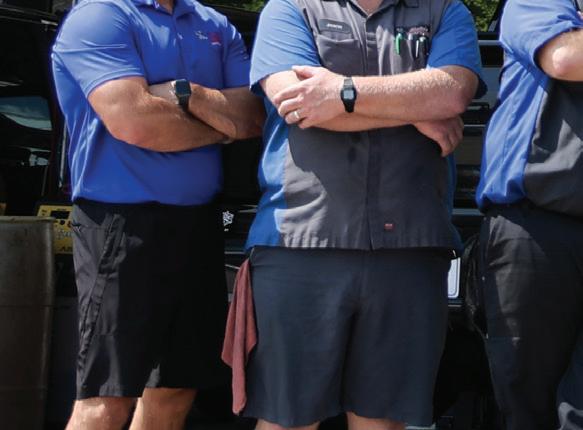
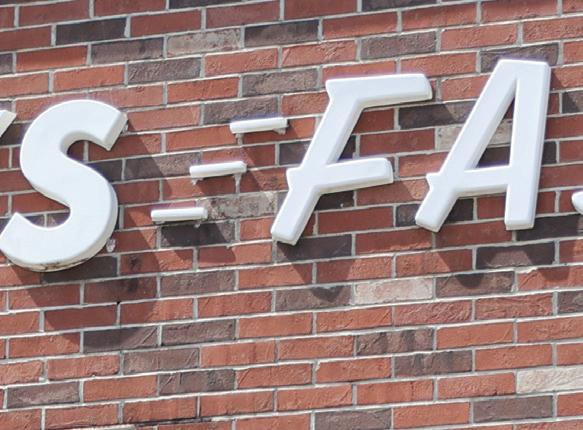
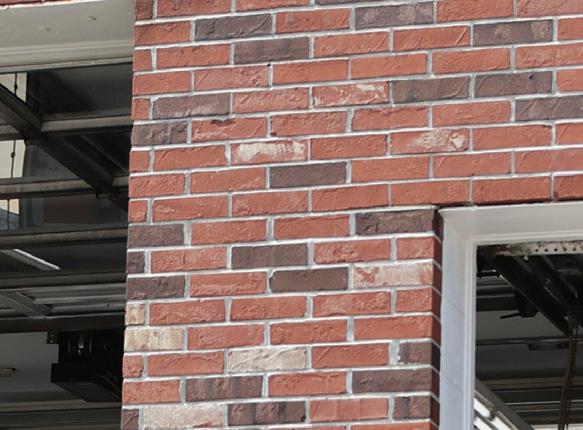

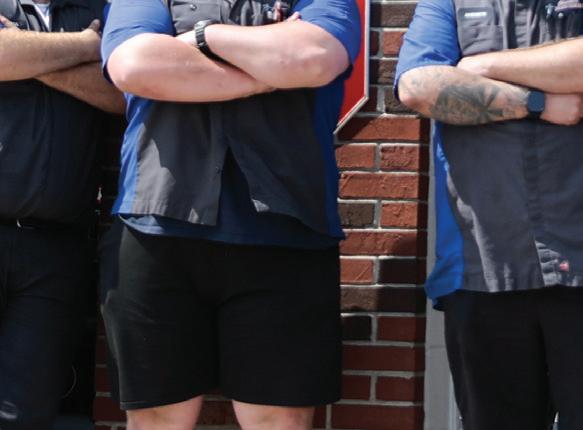

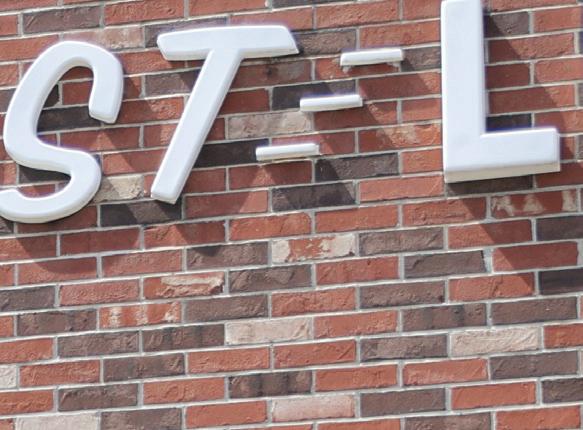
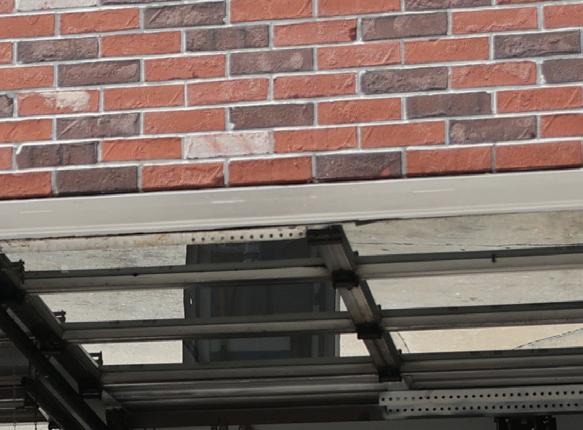




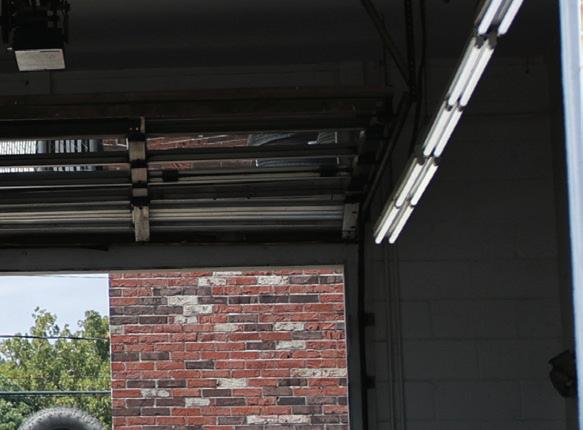






















































































































For operators looking to refine their data collection practices, Glueck offers the following tips: Carve out time to get it done, whether you hire someone to focus specifically on data tracking or have an existing employee double up on responsibilities. For Glueck, it’s the latter, with Hinkebein serving as both a data analyst and district manager. Either way, Glueck says, “you have to create and make time to do it. If you don’t have the data, you’re kind of the blind leading the blind.”































































































“Don’t get lost in the sauce. Don’t create busy work and track things you have no intention of doing anything with.” Invest in what you can afford. Glueck recalls a recent meeting he had with fellow quick lube operators. Tracking bay times became a hot topic of conversation, with attendees marveling at one operator’s elaborate, high-tech setup.





Keep it simple, and focus on tracking data that is actionable. “One of the big things I’ve learned along the way is don’t track anything you’re not going to use,” Glueck says. “You can get lost in the sauce pretty quick and think you need to track everything out there. ‘We’ve got to track every single item from this year, and how does that relate to last year, and the year before, and to this store, and…’



“(Bay times are) something we all want to track. I want to track that, but it’s expensive to buy all the cameras. And then you have to have somebody in your organization that’s going to extract that and put it to use,” Glueck says.









































































“We’re all blown away by what (the operator with the bay time tracking setup) is able to do, but he’s like, ‘Look, don’t get lost in this stuff. You can track data all day long. But just being in the stores and around the stores and having that general atmosphere is worth more than any of these numbers.’”
As the Charlie’s team has developed its KPI-tracking procedures, Glueck says his focus has not been on adding more metrics to track, but rather better connecting the dots between those that the company has already been monitoring. For the core 13 items offered in addition to basic quick lube services—referred to internally as “BTIs” (big-ticket items)—Hinkebein has built spreadsheets to keep tabs on sales relative to car counts.
“How many BTIs did I sell relative to car count today? That’s a metric I look at a lot,” Glueck says. “I know it doesn’t mean a lot to other owners because they don’t have ‘BTIs,’ but basically, what percentage of (customers) are we selling extra services to? Is that 40%, 30%, 50%? Where is that metric?”
Responsibilities for BTIs at Charlie’s are also divided and assigned to specific job functions within the shop. Hood technicians are responsible for one group of products/ services, while a pit technician has responsibility for other add-ons.
“That makes it easier to identify areas that need some extra training,” Glueck says. “If you see a tendency at one store or all the stores that they’re lacking in one particular thing, then maybe that’s a training focus for us. Those kinds of collaborations are what I would say have helped more so than any (singular item) tracking. It’s being able to put it together and see trends better.”
Car counts and BTI percentages are among the metrics that Glueck considers his “golden KPIs.”
“I look at that BTI percentage because when I see a dip and it gets down in that 20% to 30% range, I know we’ve got a process issue with that store, and we need to see what’s going on," he says.
“On the same side, when we see


that same thing trending in the other direction and it’s up closer to 50%, that’s also a red light for me. We’re not here to oversell or offer things to a guest that they don’t need. We have that happy medium there.”
While building an efficient metrics platform has helped Glueck keep his business profitable, there is one KPI he especially values, and it isn’t found on any of his spreadsheets.
“More than tracking any of the stuff, I would say my No. 1 KPI that’s not on paper is what’s the overall atmosphere of the store when you walk in? What’s the morale?” he says. “You can instantly feel it when you go in, and a store is clicking. The manager is engaged. He’s upbeat. He’s

positive, and his crew is, too. That store, you can look at their sales, and those are going to follow it.”
It’s a two-way street, Glueck adds. A store with a gloomy atmosphere and an unhappy manager is more likely to deliver lackluster service to guests and have uninspiring sales to match.
“That’s probably my biggest thing,” he says. “When I visit with my district managers, what’s your overall feel of that store right now, aside from any numbers. This is what’s going to dictate the numbers.”




by Peter Suciu

Clifford Barnett has an eye on the future of his SpeeDee Oil Change & Auto Service business.
Clifford Barnett, owner and operator of SpeeDee Oil Change & Auto Service in Dallas, Texas, has been in the quick lube industry for just five years as of this past July, but he’s already looking far
into the future of what he hopes to see become a long-lasting family business.
His long-range game plan has been to expand to three locations, which will then be handed down to his daughter and two sons. To help speed the next generation in their journey, the two oldest, 24-year-old Jade and 18-year-old Connor, are already being taught the ropes. It will still be years before the reins are handed over, but when that occurs, Clifford Barnett says he will make sure they’ll be prepared to succeed.
That has included teaching them the ins and outs of the operation, everything from understanding mechanics to bookkeeping to people skills. It has been literally hands-on training that began when both Jade and Connor could barely drive.
“Don’t hand your child a title,” Barnett says. “You have to help them learn the ropes.”
Many parents today struggle with figuring out how they’ll pay for their kids’ higher education, let alone thinking about handing the keys to a future business. Still, for this family, that has also been part of the long-game plan.
Barnett tells National Oil and Lube News that since deciding to acquire his first shop, he has planned for it to expand to three locations, which will be passed down to his three children.
“They don’t really know this, because I didn’t want them to expect it,” he adds, acknowledging that they may not take the business lessons as seriously if they knew what lies in store.
Instead, he says that for their long-term success, they need to understand the importance of hard work, especially in an industry that can succeed or fail based on the customer











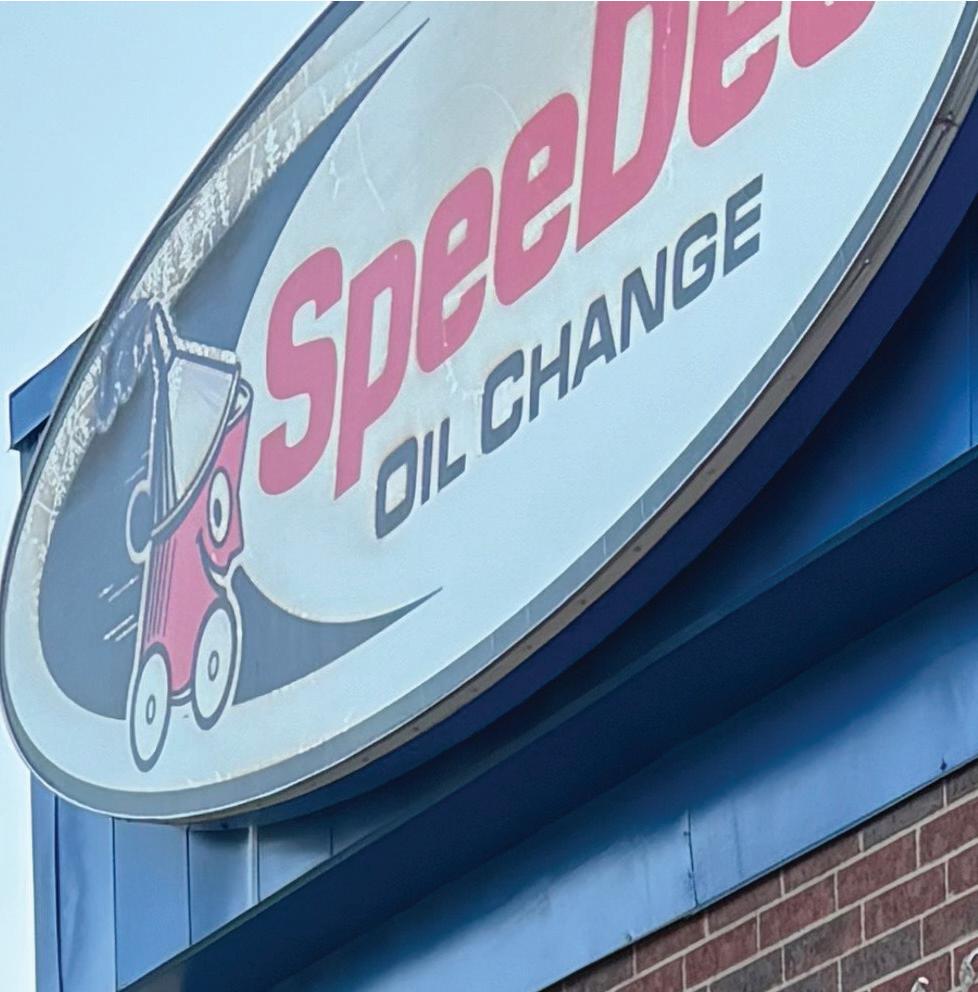
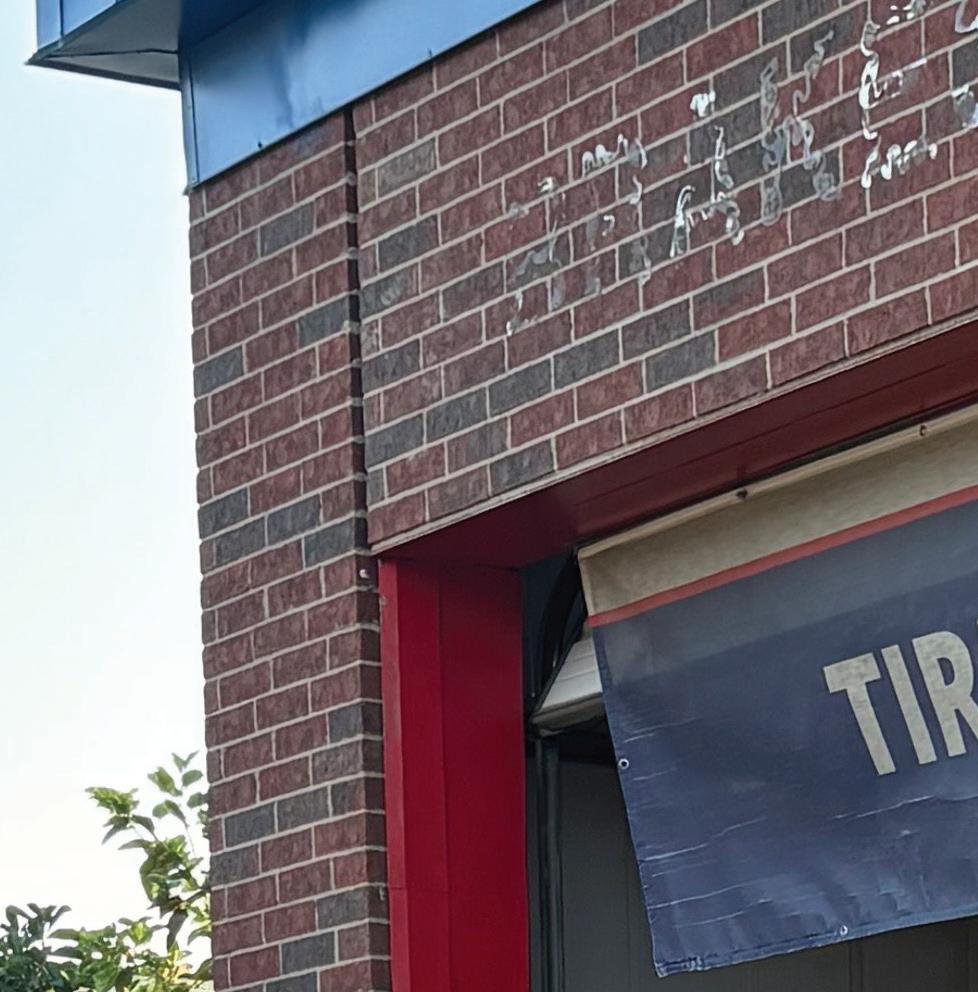
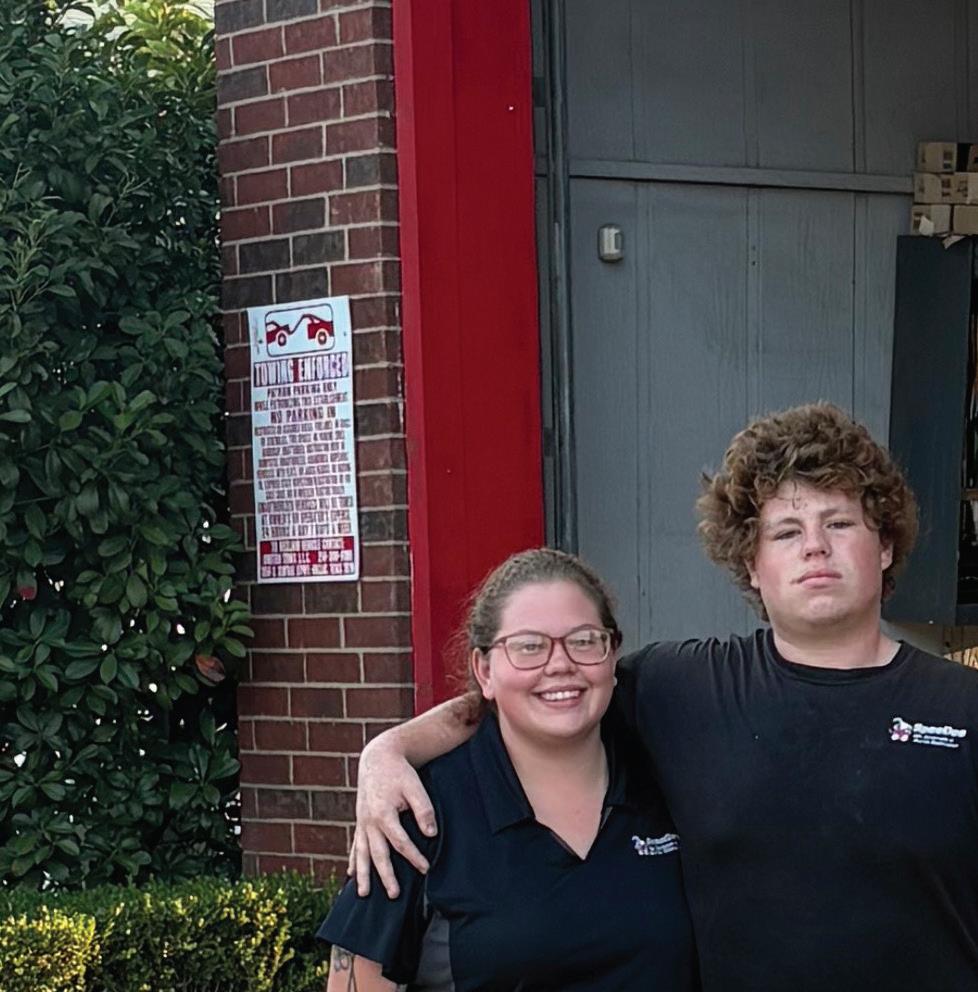
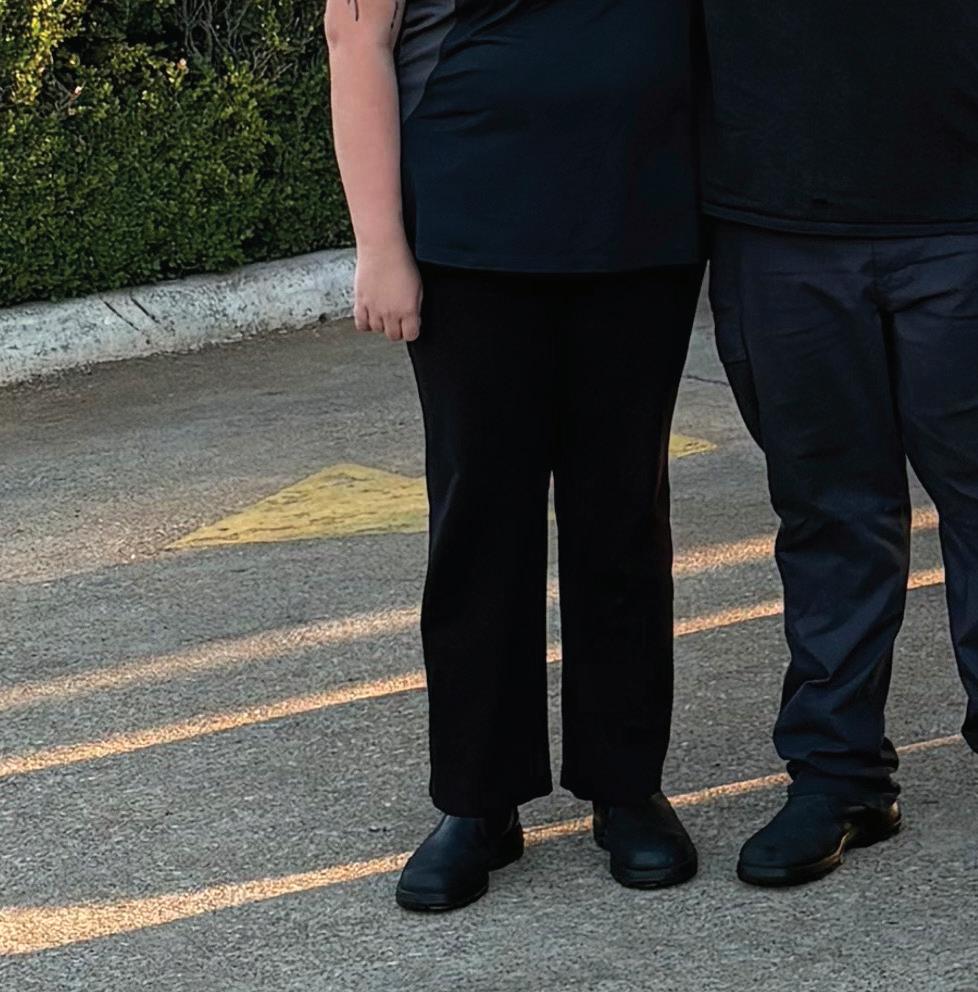



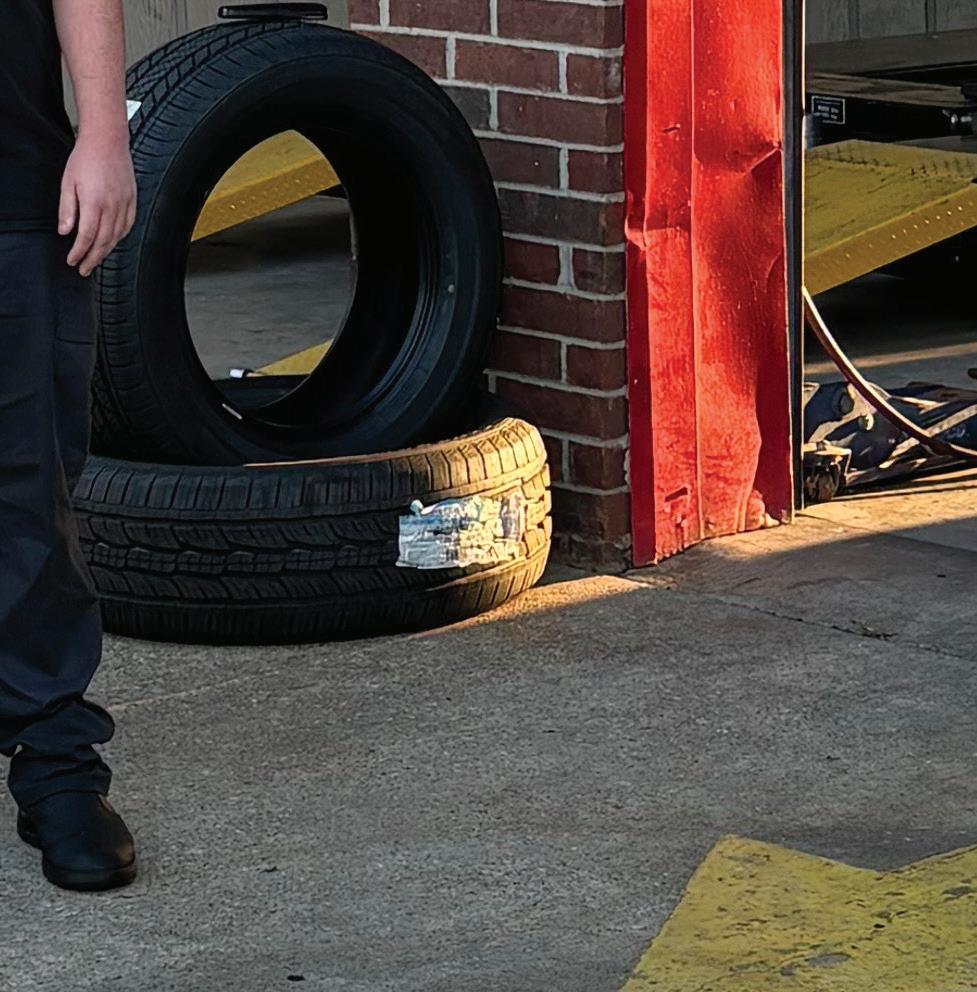
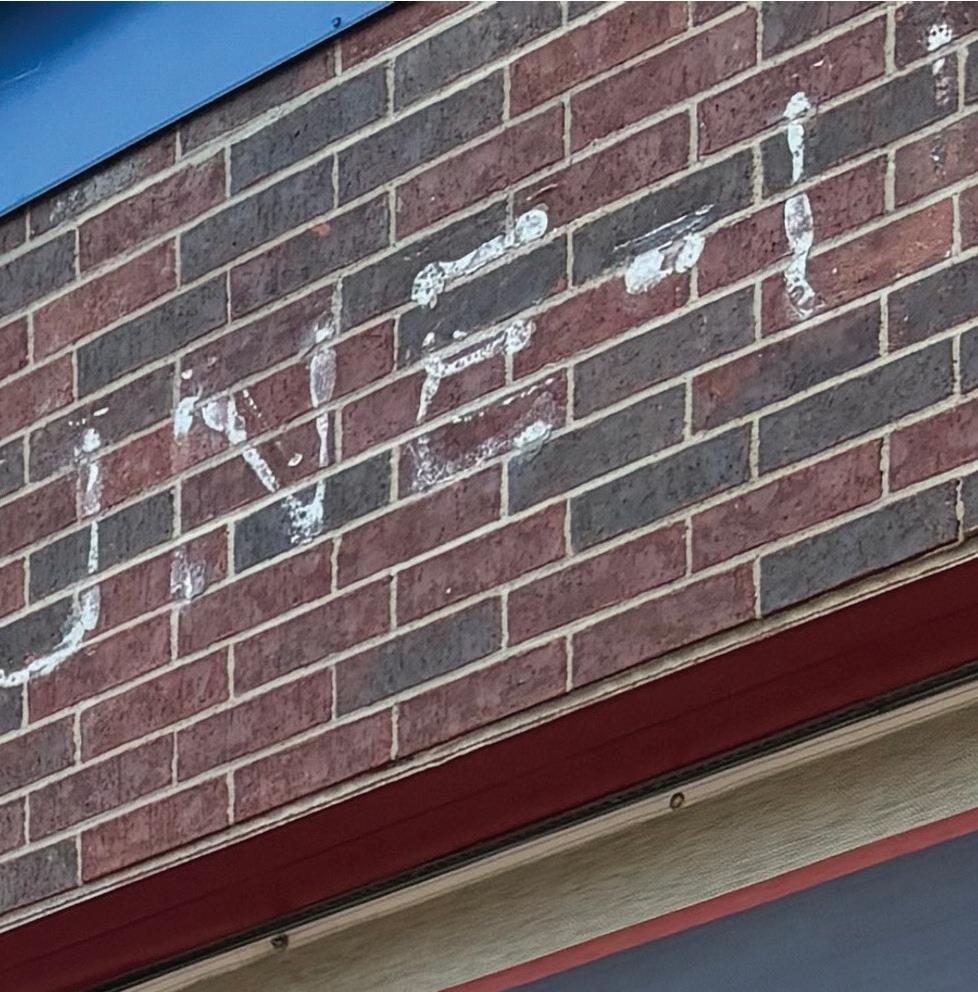
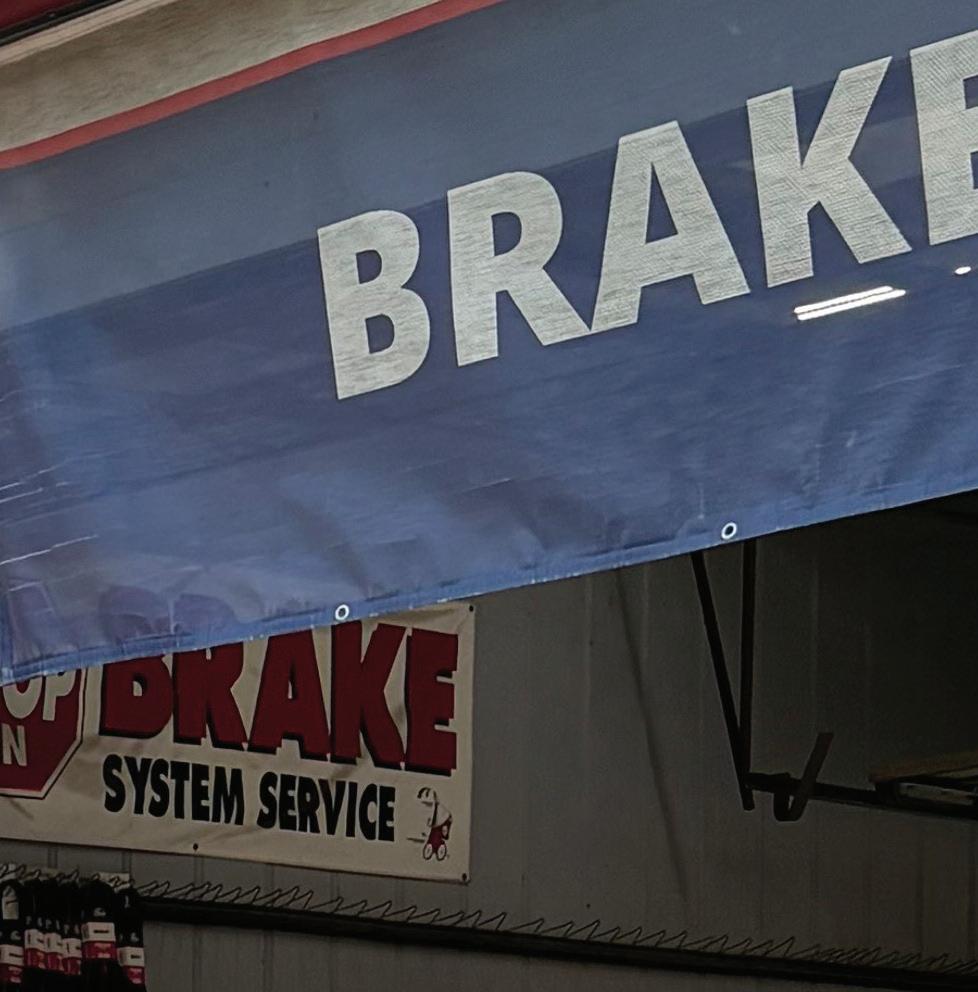




experience. That includes solving problems that come with automotive maintenance. He further acknowledges that the industry has to overcome its old reputation and the stigmas that go with it.
“This came naturally to me when I was Connor’s age, even though I wasn’t a big car guy,” says Barnett. “My daughter and son have much more interest in cars than I ever had.”
Daughter Jade has been working alongside Barnett since day one and is now one of his seven full-time employees. She graduated from Texas Woman’s University (TWU) and plans to earn a master’s degree in business.
Connor graduated from high school and will begin classes at Universal Technical Institute (UTI) next year to be trained as a mechanic. He started working while in high school, coming into the shop every other weekend. He started by cleaning the windows and vacuuming the floors before moving on to changing tires and taking on a lot more responsibility.
“Connor has shown a lot of grit,” says Barnett. “He’s my pit guy right now.”
Jade and Connor may have the same last name as the boss, but they’re not granted special treatment, and part of their training has been on not taking employees for granted. That has required that Barnett to switch between being their parent at home and their boss on the shop floor.
One point Barnett made clear is that there
is no such thing as too much communication when it comes to preparing the heirs to lead the business.
“My grandpa taught me from a young age that I should try to learn something every day, and that’s what I’m passing on to the kids,” Barnett tells NOLN.
That has included, and will continue to involve, all aspects of the business. It consists of knowing what the techs do on the shop floor, how the business runs smoothly to keep the lights on, and working with customers.
“You don’t take the employees for granted, and you need to understand we’re in the service industry,” says Barnett. “The customer comes first, and there is that old saying that the customer is always right. But in the auto service industry, they can often be wrong, so part of the job is leading them so that they can see that.”
It is that balance that Barnett is already working to instill in Jade and Connor.
“But I want everyone in the shop to understand it is the customer and me versus the car, instead of the customer against me,” Barnett further explains.
Even as the first two are beginning their training, which could result in them running their shops in the coming years, Barnett says expansion is still very much in the cards. The long-term goal is at least those three shops.
“Long-term goal is five years,” he adds. “Right now, I’m just waiting for interest rates to go down.”
My grandpa taught me from a young age that I should try to learn something every day, and that’s what I’m passing on to the kids."
–CLIFFORD BARNETT, OWNER AND OPERATOR OF SPEEDEE OIL CHANGE & AUTO SERVICE
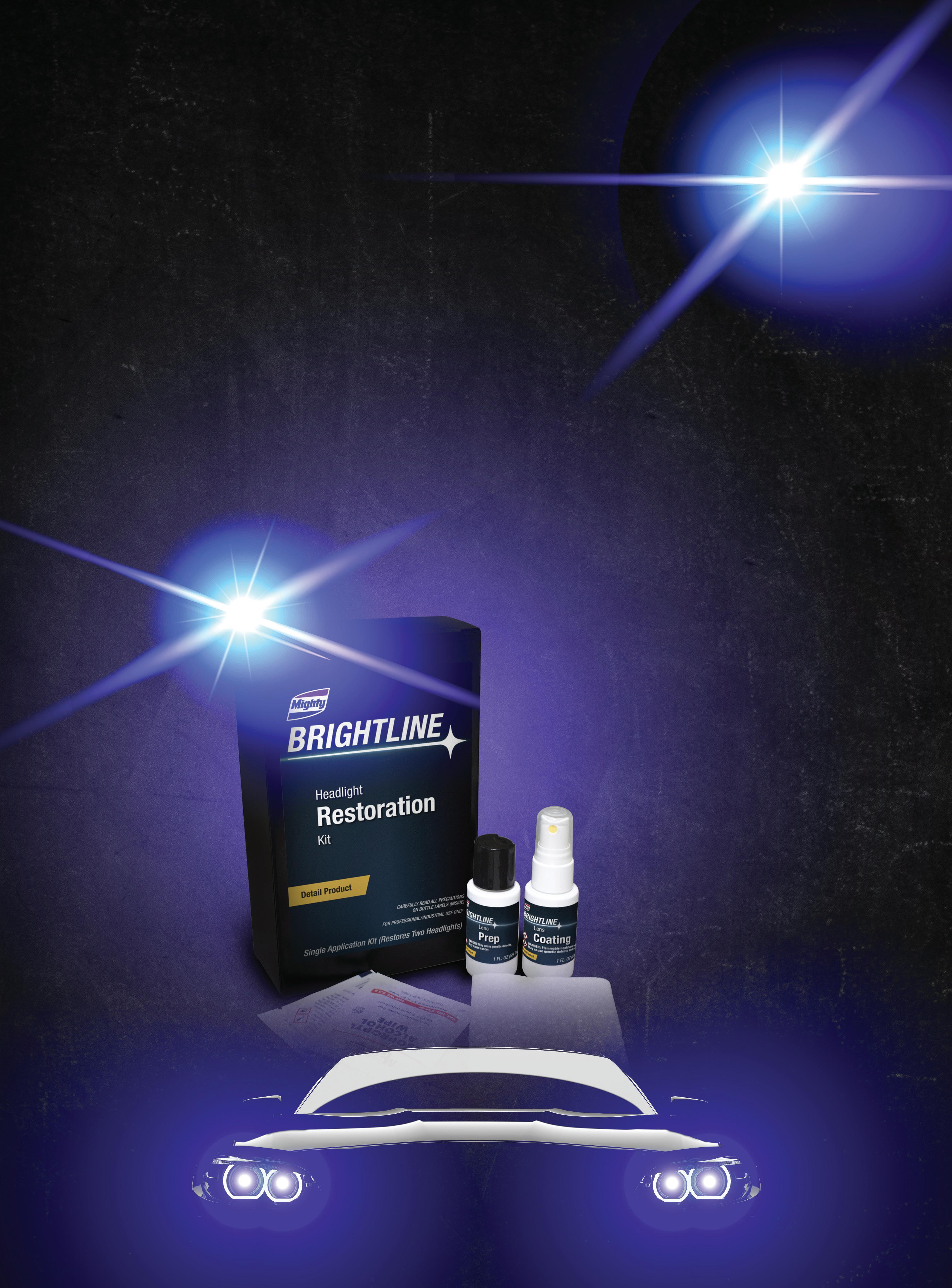

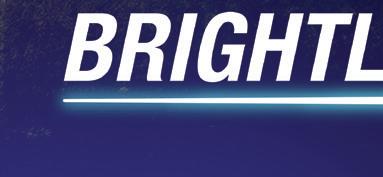
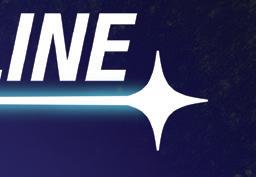
BY AMBER KOSSAK, CEO OF SOLID START
If you’ve ever been on a team where everything was clicking, you know what an extraordinary feeling it is. When challenges are shared and the joy of victory is shared, you know you’ve been part of something special. How can we capture and retain this team spirit and sense of accomplishment in our workplaces?
Polling data from the Gallup organization indicates that work satisfaction is the exception and not the rule. According to Gallup, only 36 percent of U.S. employees are truly engaged in their work.
What does this say about our work environments today? Many employees have concluded that bosses don’t really care about job satisfaction for their employees. This may be true in a few situations, but I suspect that in most cases something else may be going on. Many employers and managers may desire better cultures for their workers, but they simply don’t know how to get there from wherever they are.
Great teams just don’t happen. Building a team culture is one of the challenges and responsibilities of leadership. A positive work environment doesn’t happen automatically. Leadership and wise management have never been more important in order to keep our valuable key people.
As we complete our second year of the pandemic, one of the big surprises has been the pervasive labor shortage. According to the U.S. Bureau of Labor Statistics, the number of job openings increased to 11 million by the end of October 2021.
For many small businesses, one side effect of this labor shortage is that greater workloads are being shouldered by fewer people. This added stress can result in additional chafing amongst workers at times. Strong teams rise to the occasion when circumstances require it. The solution is often as simple as a mental adjustment. When events occur that throw us off our game, it’s how we interpret them that makes all the difference.
Creating a healthy work culture not only helps retain employees but also enables them to thrive.
There’s a myth out there that work is always going to be a pain, that real life begins on the weekend. The reality is that many people find their work to be personally rewarding, and I am not referring here to payday. According to a Pew Research study, more than one-third of our
workers find meaning in their work. Creating a team in which the right people are in the right roles all moving in the same direction is quite powerful. Imagine creating a team in which people look forward to Monday morning as much as they do Friday.
Hiring well and getting the right people in place is important. Everyone knows that Tom Brady is more suited to be a quarterback than a middle linebacker or kicker. In positions that require specialized skills, you look for people who have this or that kind of background and experience. Pro coaches continuously endeavor to acquire the right players for the various positions. They don’t try to force players to be what the coach thinks they should be, but allow them to be their authentic selves within the roles they play. The ultimate goal is to nurture these various individuals into a cohesive unit.
Here are a few things a leader needs to convey to the team:
VISION: Where do you see your company going in the future? What are the short and long term goals the team is working toward? How will you measure success? How will success be rewarded?
RESPECT: Leaders and managers teach respect by modeling respect for each individual on the team. This is an integral part of servant leadership.
TRUST: Sometimes talented people do more than their share of the work not because they want to please the boss, but because they don’t trust the team. As we build confidence in the team, employees can let go of some of the anxiety that balls might get dropped or details neglected.
It is sometimes easier said than done, but never forget to be kind and treat your people as the valuable piece they are. And when you communicate, make sure you communicate clearly. In building a strong team there is a saying I have come to appreciate, “If you want to go fast, go alone, but if you want to go far, go together!”
Amber Kossak is the CEO of Solid Start, manufacturer of True Brand Products. She has been in the automotive industry for almost 20 years and is serving on the AOCA board of directors. She can be contacted at kossak@solidstart.com. For more information please visit solidstart.com.
“Our up-and-coming people go alongside senior leadership,” Enns says of tradeshows on the car wash side, in particular. “It might be that a young person gets on a plane for the very first time and has a brand new experience going to Las Vegas, for instance.”
Attending industry events can help quick lube professionals solve business problems, see what’s on the horizon, and more
BY CAROL BADARACCO PADGETT
IMAGINE THE BENEFIT OF being able to accurately envision the future—today. What technologies will impact your business the most tomorrow? How can you begin to improve your current and future customers’ experiences right now? How can you make your team stronger today for the industry changes they’ll face tomorrow? And what new tools can your business benefit from the most?
These are the kinds of questions quick lube and quick maintenance owners can answer by a ending industry events, according to Ben Enns, director of people and mission at Petaluma, California-based Oilstop. He knows from first-hand experience.
Here are four key areas where Oilstop—a combination of oil change
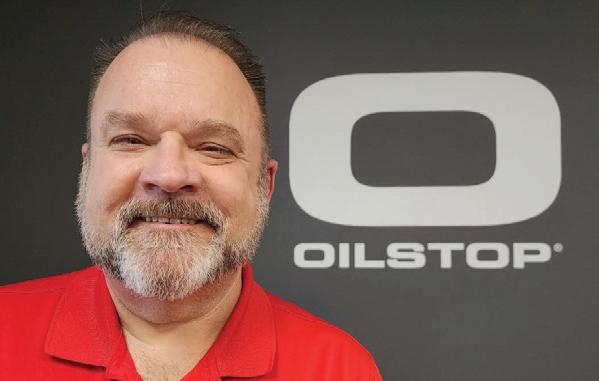
shops and car washes—has benefited from prioritizing attendance at outside events.
Cultivating Employees’ LifeLong Love of the Industry
Enns says when Oilstop sends both veterans and new hires alike to tradeshows, the company reaps big benefits.
He continues, “When a company invests in someone, it can spark an idea for a future career. As an industry, we’re all in the same boat and doing the same sorts of things, and great ideas come out of the trade events. It gives the new person the opportunity to see there’s something bigger than the day-to-day they experience at work. They begin to understand they’re part of an organization deeply rooted in serving people.”
Enns adds, “It’s a beautiful thing for an organization to believe in someone before they believe in themselves. It’s my favorite part, getting new people exposed to being part of a larger community where they can see a career path.”
An owner who goes to a trade event with a business problem in mind will likely find a fix.
As Enns says, “Go with the desire to find a solution, and you’ll probably find one. But if you attend without an end game in mind, without a clear picture of what you’re looking to find, the event will not be as valuable.”
Maybe you’re looking for finance options that can work for your business, for instance, or maybe you have equipment needs and questions.
“You can be exposed to different product manufacturers to supply the equipment that meets the needs of your facility,” Enns says. “And they can share solutions to your issues.”
In addition, Enns says that when Oilstop’s owners attend events, they get a better grasp of the importance
of strategic planning for the future. For example, they gain new perspectives on operating a particular location, and sometimes fresh insight into how to best serve their local community.
For businesses with multiple components of service, attending industry events can help owners and employees understand the nuances of each.
of Frequency: January/February, March, April, May, June, July, August, September, October, November/December
Complete Mailing Address of Known Office of Publication (Not Printer): Endeavor Business Media, LLC, 201 N Main Street, Ste. 5, Fort Atkinson, WI 53538
Contact Person: Tracy Skallman Telephone: (800) 547-7377
Complete Mailing Address of Headquarters or General Business Office of Publisher (Not Printer): Endeavor Business Media, LLC,30 Burton Hills Blvd., Ste. 185., Nashville, TN 37215
Full Names and Complete Mailing Addresses of EVP, Editorial Director, and Managing Editor - EVP: Chris Messer, Endeavor Business Media, 571 Snelling Ave N, St. Paul, MN 55104; Editorial Director: Chris Jones, Endeavor Business Media, 571 Snelling Ave N, St. Paul, MN 55104; Managing Editor: Tom Valentino, Endeavor Business Media, 571 Snelling Ave N, St. Paul, MN 55104
Owner - Full name and complete mailing address: Endeavor Media Holdings I, LLC, 905 Tower Place, Nashville, TN 37204; Endeavor Media Holdings II, LLC, 905 Tower Place, Nashville, TN 37204;Resolute Capital partners Fund IV, LP, 20 Burton Hills Blvd, Suite 430, Nashville, TN 37215;RCP Endeavor, Inc, 20 Burton Hills Blvd, Suite 430, ,Nashville, TN 37215;Northcreek Mezzanine Fund II, LP,312 Walnut Street, Suite 2310,Cincinnati, OH 45202;Invegarry Holdings, LP,44235 Hillsboro Pike,Nashville, TN 37215;Everside Fund II, LP,155 East 44th St, Suite 2101 - 10 Grand Central,New York, NY 10017Everside Endeavor F1 Blocker, LLC, 155 East 44th St, Suite 2101 - 10 Grand Central, New York, NY 10017;Everside Endeavor International Blocker, LLC, 155 East 44th St, Suite 2101 - 10 Grand Central, New York, NY 10017;Everside Founders Fund, LP, 155 East 44th St, Suite 2101 - 10 Grand Central, ,New York, NY 10017;Suncap Endeavor Blocker, LLC,155 East 44th St, Suite 2101 - 10 Grand Central,New York, NY 10017; Known Bondholders, Mortgagees, and Other Security Holders Owning or Holding 1 Percent or More of Total Amount of Bonds, Mortgages or Other Securities: None Tax Status (For completion by nonprofit organizations authorized to mail at nonprofit rates) (Check one) The purpose, function, and nonprofit status of this organization and the exempt status for federal income tax purposes: N/A
Publication Title: NOLN
14. Issue Date for Circulation Data: September 2025
Total Number of Copies (Net press run) b. Legitimate Paid and/or Requested Distribution (By Mail and Outside the Mail) (1) Outside County Paid/Requested Mail Subscriptions stated on PS Form 3541. (Include direct written request from recipient, telemarketing and Internet requests from recipient, paid subscriptions including nominal rate subscriptions, employer requests, advertiser’s proof copies, and exchange copies.)
(2) In-County Paid/Requested Mail Subscriptions stated on PS Form 3541. (Include direct written request from recipient, telemarketing and Internet requests from recipient, paid subscriptions including nominal rate subscriptions, employer requests, advertiser’s proof copies, and exchange copies.)
(3) Sales Through Dealers and Carriers, Street Vendors, Counter Sales, and Other Paid or Requested Distribution Outside USPS®
(4) Requested Copies Distributed by Other Mail Classes Through the USPS (e.g. First-Class Mail®) Total Paid and/or Requested Distribution (Sum of 15b (1), (2), (3), and (4))
(1) Outside County Nonrequested Copies Stated on PS Form 3541 (include Sample copies, Requests Over 3 years old, Requests induced by a Premium, Bulk Sales and Requests including Association Requests, Names obtained from Business Directories, Lists, and other sources)
In-County Nonrequested Copies Stated on PS Form 3541 (include Sample copies, Requests Over 3 years old, Requests induced by a Premium, Bulk Sales and Requests including Association Requests, Names obtained from Business Directories, Lists, and other sources) (3) Nonrequested Copies Distributed Through the USPS by Other Classes of Mail (e.g. First-Class Mail, Nonrequestor Copies mailed in excess of 10% Limit mailed at Standard Mail® or Package Services Rates)
(4) Nonrequested Copies Distributed Outside the Mail (Include Pickup Stands, Trade Shows, Showrooms and Other Sources)
Total Distribution (Sum of 15c and 15e)
Enns says Oilstop’s dual oil change and car wash components require a slightly different approach. For example, the oil change side may benefit from new technical types of information and data, whereas the car wash side may require more of a focus on soft skills, like customer service.
“Having a servant’s heart is universal across all sides of the business, though,” Enns says. “It’s serving others to meet their needs before your own. This is our business model at Oilstop, and it works well in both aspects of the business. Across the board, people love to be served.”
All of the insight gained at industry events eventually circles its way back home, because tradeshows help generate great ideas. On the local level, Enns says it’s important for all businesses to be a part of local business councils, such as the Better Business Bureau.
Involvement and investment into local schools, sports teams, and notfor-profits is also important.
“Showing concern to serve the local community is powerful,” Enns reiterates. “Through our initiative Oilstop Cares, we find nonprofits like She Is Hope, in Southern California, and we match donations that help get single women and children out of living in their cars.”
He adds, “We put it on our staff to come up with which organizations we’ll support locally. The team at each location is tasked with finding a niche nonprofit to support.”
Oil change businesses—like most—also benefit from creating events that forge close connection.
As Enns says, “We recently took 200 employees and their families to a (ballgame). It gave CEOs the opportunity to thank them for their efforts every day. Events like this also help us create a culture of fun.”







• BUY AT DISCOUNTED PRICES • RECEIVE PRODUCT TRAINING & SUPPORT
• ACCESS TO THE ENTIRE PRODUCT LINE • EXPAND YOUR REVENUE CHANNELS

























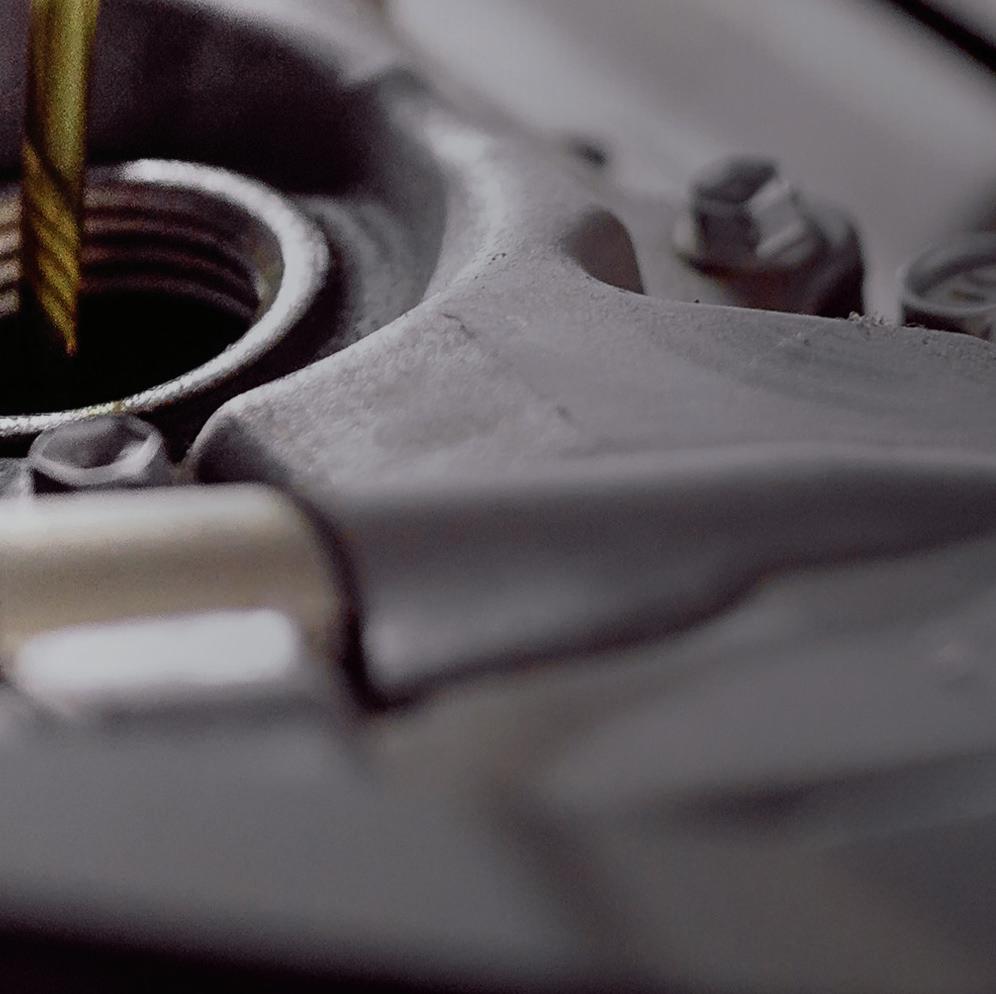



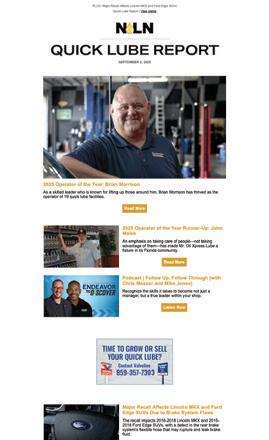








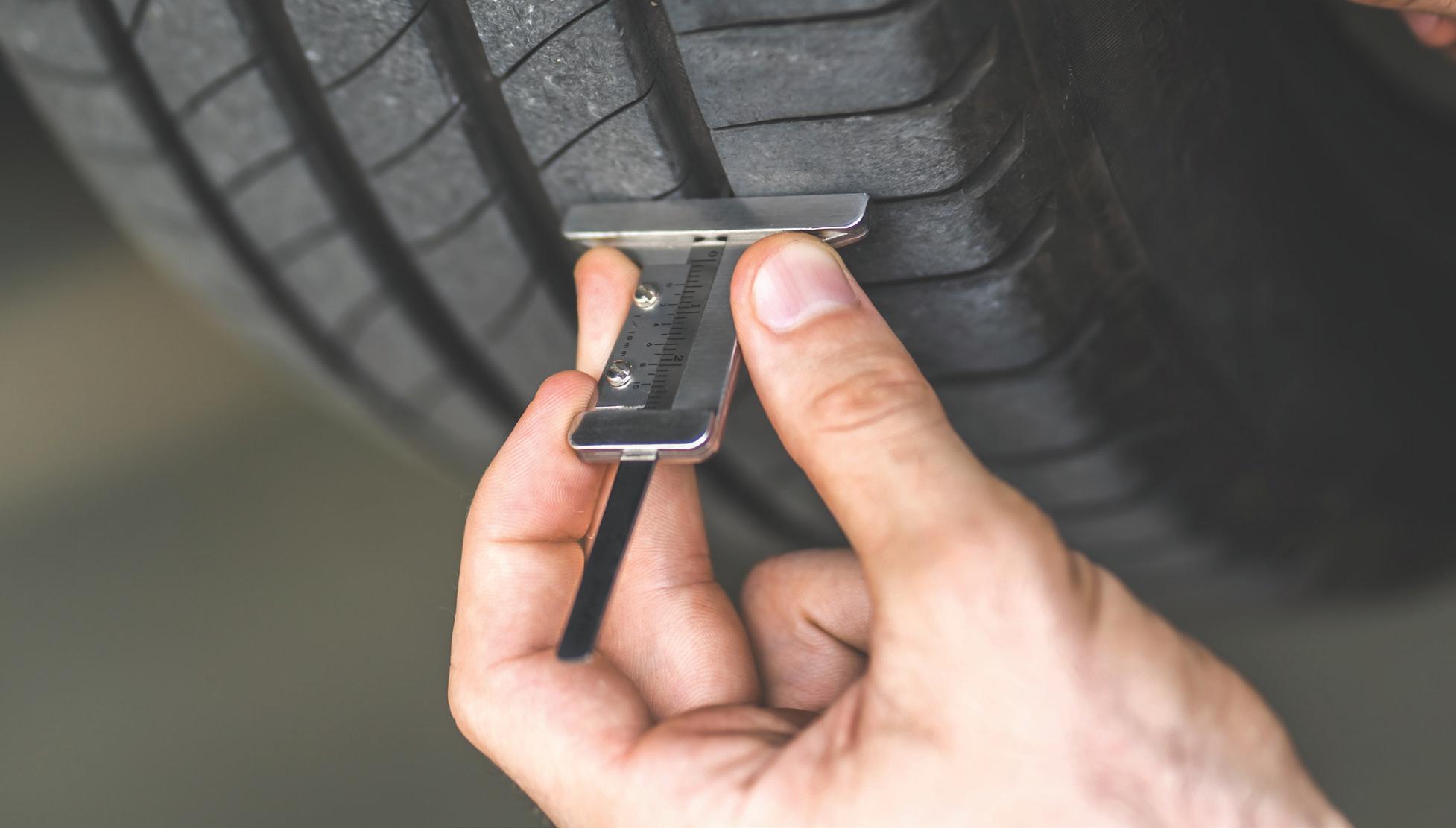
Quick lubes can identify potential issues with courtesy checks of tire pressure, tread wear, and visual evidence of defects
BY EMILY KLINE
that don’t specialize in tires, tire inspections can be a valuable a part of the quick lube process. For many drivers, oil changes are the one and only consistent full-body wellness check for their vehicles.
By adopting standard procedures for tire and fluid checks, quick lube shops can provide added value without taking unnecessary risks, while also building trusting relationships
with their guests.
To discuss the ins and outs of tire checks at quick lube shops, NOLN caught up with Ken Frenchak, general manager at Valvoline Express Care in Grove City, Pennsylvania, and Rick Rivera, owner of Classic Lube in DeLand, Florida.
It is important to first note that even
though courtesy checks of tires are encouraged, Frenchak and Rivera agree quick lube shops should be aware of the added layers of liability associated with getting into providing full tire services.
Both Valvoline Express Care and Classic Lube choose not to provide full tire services, citing strong liability issues.
“If your shop does tire rotations, you’re now opening yourself up for additional liabilities,” Frenchak says. “For example, if the tires aren’t torqued properly on a car—that car drives down the road, the tire falls off, and the vehicle wrecks—who’s the responsible party?”
For Classic Lube, additional factors have gone into the decision to not offer full tire services, adds Rivera.
“Tire replacement requires too much space for inventory and creates problems for the quick lube shop that our technicians are not trained in,” Rivera says. “We are not tire people.”
For quick lube shops looking to get into tire sales and service, the
addition of such offerings requires an investment in tire service equipment (including mounting and balancing equipment), as well as TPMS service and tire repair service. Training is needed for technicians, as well.
But even for shops that are not looking to make a full leap into the world of tire service and sales, performing simple courtesy tire checks still can be easy opportunity for quick lubes to build trust with their guests, say Rivera and Frenchak.
As oil change intervals get longer due to improvements in oil and cars, most vehicles will show tire wear and tear every—or every other—oil change service. Because of this, courtesy checks of tire pressure, tread wear, and visual evidence of potential defects are invaluable.
“Our pit tech is trained to look at tires for abnormal wear, such as belts showing on the inner side and uneven wear,” Rivera says. “These traits are easy to spot from under the vehicle.”
To ensure quick lube shops don’t miss anything important when it comes to tires, shop owners should ensure they have a standard operating procedure in place for courtesy
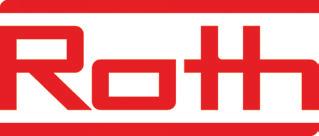
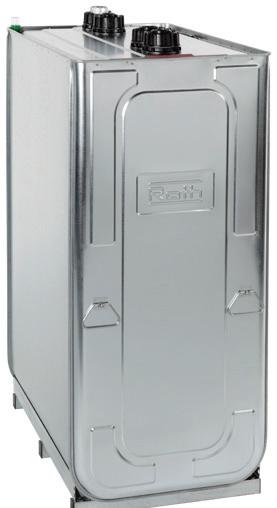
•
•
•
checks of tires.
At Classic Lube, that SOP for tire inspections includes the following:
• A flexible tipped digital gauge is used to avoid breaking off valve stemmed sensors.
• Tire pressure is set per the sticker on the door.
• Techs inflate to half-pound measurements on the gauge so 33 lbs. becomes 33.5, for example. This allows the vehicle to show all the tires at the same pressure.
• To limit tire-related liability, the only documented tire-related item put on customer receipts is a recommendation for a tire rotation.
In addition to tire checks, Rivera also encourages his customers to bring their vehicles in between oil changes. He does this by offering a free courtesy check that includes a look at tire pressure and fluid levels, as well as scanning check engine lights.
At Valvoline Express Care, the SOP for courtesy checks is very similar.
“First, we set the tire pressure to the recommended tire pressure that’s in the door jamb the manufacturer recommends,” Frenchak says.
“While that’s being done, the tech is also doing a visual inspection of the tread depth and any visual wear
and tear on the front tires. If they see anything, they communicate that verbally to the customer.”
Both shops have regional tire businesses that they will direct their customers to. This is a great way for quick lube shops to create relationships with tire dealers. Not only does it create business for the tire dealers, but it also encourages those businesses to send their customers back for oil changes in return.
Customers might not expect tires to be a topic of conversation when they arrive for an oil change at a quick lube that doesn’t offer tire sales and full tire service, but if technicians are able to spot a potential issue, it will demonstrate that the quick lube business is considering more than just oil and filters when it comes to the condition of their guests’ vehicles.
“Anytime you can credibly alert a customer about a possible problem, they will be thankful,” Rivera says. “It is our belief that every time we alert a customer about any possible issues with their vehicle prior to failure, it instills their trust in us. It changes a one-time customer into a long-term one.”
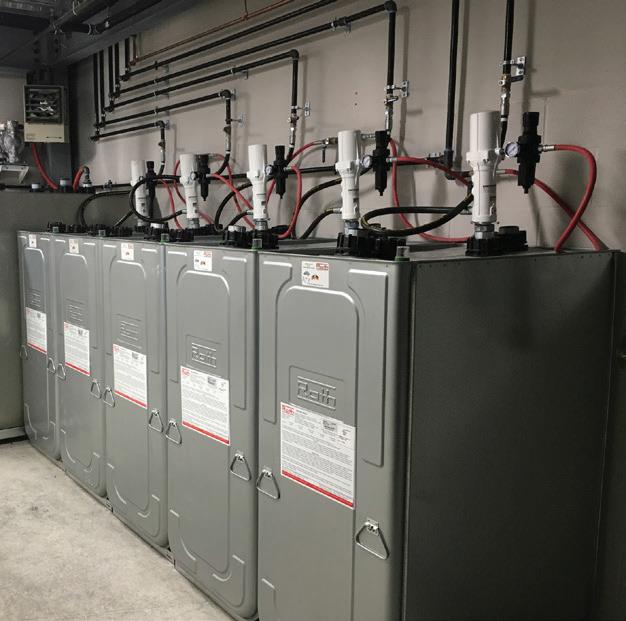
BY SPIRO MOROGIANNIS, BG TRAINING MANAGER AND BGU INSTRUCTOR
Key performance indicators (KPIs) are measurable values that show how effectively an individual, team, or organization is achieving a specific objective. They can show if you are on the right path and reveal areas of business opportunity. Understanding or knowing how to set up your shop’s metrics and KPIs is not always easy but is required to understand shop profitability and your business. Think of KPIs like your vehicle’s dashboard—the speedometer, fuel level, and coolant temperature—they show how your business is running.
Perhaps you want to know about your team’s productivity, the number of cars serviced per day, or the average time it takes to complete a job; KPIs should be specific, measurable, achievable, relevant, and timely. These can make goal setting realistic and create a shop culture of consistency established by metrics.
KPIs matter because they help you spot how and why to make smart business decisions, such as profitability and production tracking, while helping you keep a pulse on your shop’s overall performance. You don’t need 50+ KPIs, but a select few can transform your business by keeping you on track.
These four core KPIs are MUST-HAVES for all quick lube owners:
1. Cars Serviced per Day: As obvious as this seems, this benchmark can be used to determine baseline daily shop profitability and minimum vehicle operational requirements. This metric can be modified and expanded, but beginning here is a great starting point.
• Why it matters: Measures daily, weekly, and monthly vehicle count.
• Formula: Total cars serviced divided by number of business days/weeks/month.
• Goal: Identify trends, profitability from base oil services, daily volume averages/busy days, and staffing based on those highvolume hours/days.
2. Average Dollar per Repair Order (R.O.): This is instrumental in determining your business’s “per car” opportunities. Are you selling low-margin base oil changes all day, or are you providing customers options and offering enhanced products and services? Such items as service menus and vehicle-specific options are key to quickly raising this number.
• Why it matters: Reflects upgrades or good/better/best offering
success (e.g., air and cabin filters, wipers, oil change packages, oil and fuel additives).
• Formula: Total revenue divided by total number of vehicles serviced (should be determined daily, weekly, and monthly).
• Goal: Increase revenue and profitability without sacrificing service speed or quality.
3. Gross Profit (GP) Margin: This pays the bills. Establishing, growing, and maintaining a target gross profit margin is vital to a shop’s long-term success. Knowing where you need to be to cover the bills and also be profitable is a baseline that cannot be ignored. It can be easily tracked and modified with properly set-up canned jobs (with predetermined job GP%).
• Why it matters: Shows shop profitability after direct costs.
• Formula: (Revenue minus cost of goods sold) divided by revenue.
• Goal: Each shop has a unique target determined by fixed costs, vehicle volume, upsell ratio, and job profitability.
4. Upsell Conversion Rate: This is where the pulse of your shop’s profitability is impacted the greatest. As we know, there is minimal gross profit in an economy oil service. This is positively impacted by offering additional services, such as air and cabin filters, wipers, additional oil service packages (good/better/best), and maintenance products and services created with higher GP dollars to offset low GP base oil changes.
• Why it matters: Tracks how many base oil services result in additional sales.
• Formula: Additional sales line items divided by oil changes performed.
• Goal: 30%–40% conversion with 100% of inspection findings and recommendations shared with the customer. This number can vary but should never fall under 30%. It’s OK to hear “no” as long as you’re asking. The best MLB Hall of Fame hitters have a career batting average around .300.
Although these four are not the only KPIs to consider, they are some of the most important metrics to track your shop’s profitability. Always provide your customers with great service and honest recommendations. This will not only grow your business but al so your reputation, which fuels customer retention. Transparency + honesty + consistency x 100% of your customers = a winning formula.


Charity drives and community involvement increase visibility and good will in the community
BY ENID BURNS
AS A SMALL OR MEDIUM-SIZED business, a quick lube shop benefits from a connection to its community. Sponsoring or hosting an event for a charity is a great way
to give back to the local area. It can also increase visibility and bring in business.
Some shops support car safety and the proper use of car seats for infants,
while others sponsor drives for cancer care and research. Whether it is a fundraising drive or sponsoring an event, the goodwill of the gesture creates a lasting impression on the shop.
A Burleson, Texas, shop sponsors the Chisholm Trail 100 Club and its annual Hot Rods and Heroes Motor Show to benefit first responders and their families.
A good way to find a charity or community organization to partner with is often to find a cause that resonates with the shop’s owner and employees. A connection to the community will thrive if it comes from a strong relationship or connection.
“We have been longtime supporters of our first responders, having family and friends that are first responders,” says Brett Morrison, owner of Castrol Premium Lube Express Burleson.
Castrol Premium Lube opened as a new shop in 2016 and began sponsoring the Chisholm Trail 100 Club Hot Rods and Heroes car show in 2018. This year, the event is celebrating its 11th anniversary in October in Cleburne, Texas.
Some corporations encourage franchise owners to participate in charities and community events, and occasionally offer support in drives and other activities.
The 100 Club is a not-for-profit organization that supports emergency personnel in local areas. One of the main functions of the organization is to provide monetary support for first responders who are injured or lose their lives on the job. The club has paid medical bills, home mortgages, school tuitions, and other household expenses since it was founded in Detroit in 1952.
The Chisholm Trail 100 Club chapter supports three counties, including Johnson and Hood counties in Texas.
“This is our 11th annual Motor Festival,” Morrison tells NOLN. “We expect to have close to 200 vehicles and over 1,000 attendees at this year’s event.”
The shop is one of the main sponsors of the event, raising additional funds to give to the charity.
“We regularly raise $15,000 to $20,000 at these events, and 100% of that goes to support our local first responders,” Morrison adds.
The amount raised and donated by the shop far exceeds the cost of the sponsorship. The 10 levels of sponsorship range in expense from $50 for a vendor sponsorship to $1,500 to participate as an entertainment sponsor, which comes with signage, emcee duties, logo presence, and placement on social media pages, among other opportunities.
While the Motor Festival is an annual event, Castrol Premium Lube Express Burleson has additional charities it supports throughout the year.
“We support multiple charities, but most of our charitable contributions of both time and money are focused on the Chisholm Trail 100 Club due to their dedicated support for our local first responders and their families,” says Morrison.
Many shops report that sponsorship events and drives boost employee morale. Such initiatives offer workers the opportunity to get involved in a cause. In some cases, it can be an employee who chooses the charity due to personal involvement or interests.
Morrison feels strongly about the bond with the Chisholm Trail 100 Club. He does not quantify the business it brings to the shop. He does report, however, that feedback is positive.
“I suspect it does somewhat, although that is not our main intention,” he says. “We have a large customer base of first responders, and they all know how much we care and support them.”
Participation in the event does drive business for the Burleson shop.
“Each year we have new customers come in following the car show events and mention that they are now coming in because of the support we have shown for our first responders,” states Morrison.
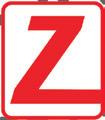



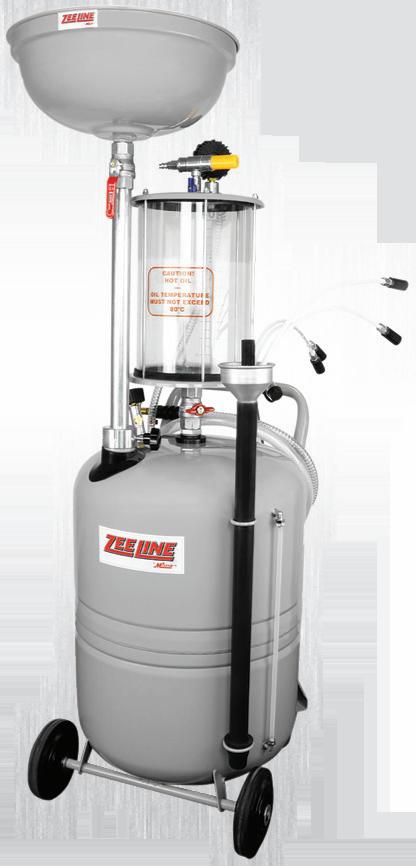
Understanding your leadership style will allow you to fine-tune your rough edges and become a more well-rounded manager



Adam Tatum is director of operations for the Virginia Group, a Jiffy Lube franchisee with 11 locations.
He has over a decade of experience in the industry with a proven track record of building customer counts and sales, as well as using innovative ways to bring a new look to the automotive field for both the customer and the employee. Performance comes from growing your business through people.
FOR THE NEXT FEW ISSUES, WE ARE GOING to discuss leadership styles and help you decide which kind of leader you are inherently. Knowing how you lead will allow you to fine-tune your rough edges and become a well-rounded manager. It will also help you in choosing and training your teams. Using a football analogy, you can have the best wide receivers, but if the quarterback cannot get the ball to them, you will not move the chains forward.
So, to start, ask yourself this one question: “A leader is … what?” How did you answer it? Did you choose to look at someone else, like a higher ranked manager or another peer who you try to model yourself around? That is what most people do—look outside. However, you need to recognize that internally, anyone can become a leader. Even if you are not managing a team daily, you might still have to step into a leadership role from time to time.
So, before we start going over each style and their respective pros and cons, think about this: Why do leadership styles ma er? Here is a quote that I have taken and placed in my leadership training presentation: “Understanding how you lead and want to lead will give you a be er sense of control over the size and scope of your reach and impact.” To be a good leader, you need to become a highly effective one. So, once you decide how you lead, take charge and move forward.
Transactional leadership. “You give me this, and I will give you that” is the easiest way to explain this one. These leaders give out instruction, and you either reward for a job well done or punish if something is not done to your standard. This is a very dictatorial style of leadership. This can be a good style for environments that are filled with strict processes and procedures to follow. The type of employees you want for this style are those who enjoy being rewarded for doing an excellent job. If your company has any kind of
sales commission bonuses, this style can keep your customer service advisors motivated to always hit their marks for financial gain. The one negative for this style is that it does stifle creativity or finding new, faster, safer ways to do things. If you find that you are the type of manager who is constantly producing new ways to reward your teams, then you are set right into this style peg.
Transformational leadership. These types of leaders are constantly seeking new and better ways to do things. They wish to make a positive change in the way that they go to business. They frequently look for input from those under them to create innovation in the workplace. These are great leadership qualities to have in any business, as they allow your team to feel like they have a say in how things are done. These leaders have highly motivated teams, and they feel like they are given a purpose. Under this leadership style, employees are given a lot of rope to try things and create new processes in the workplace. While this is a good style to build a tight-knit team of collaborators, it can have a downside. As you and your team are always looking for the best way to complete each job, not taking someone’s idea and putting it into practice may make that employee feel slighted and lose motivation.
These are just two of the many leadership styles that we will discuss over the next few months. In the meantime, think about how you lead and manage your business.
Now, do not be concerned if you find yourself relating to a little of a few styles. “Mutts” are what we call these in leadership training. They have a little bit of this and a little bit of that and it makes them who they are.
For now, do you see yourself in either of these two leadership forms? If so, take notes on what you can do to fine-tune yourself in that style and ascend to a higher level of leader.






